Search Result
Results for "
p53 activator
" in MedChemExpress (MCE) Product Catalog:
1
Biochemical Assay Reagents
2
Isotope-Labeled Compounds
| Cat. No. |
Product Name |
Target |
Research Areas |
Chemical Structure |
-
- HY-148404
-
|
|
MDM-2/p53
|
Cancer
|
|
p53 Activator 5 (compound 134A) is a potent p53 activator with a SC150 value of <0.05 mM. p53 Activator 5 can bind to mutant p53 and restore the ability of the p53 mutant to bind DNA. p53 Activator 5 shows anti-tumor activity . p53 Activator 5 is a click chemistry reagent, it contains an Alkyne group and can undergo copper-catalyzed azide-alkyne cycloaddition (CuAAc) with molecules containing Azide groups.
|
-
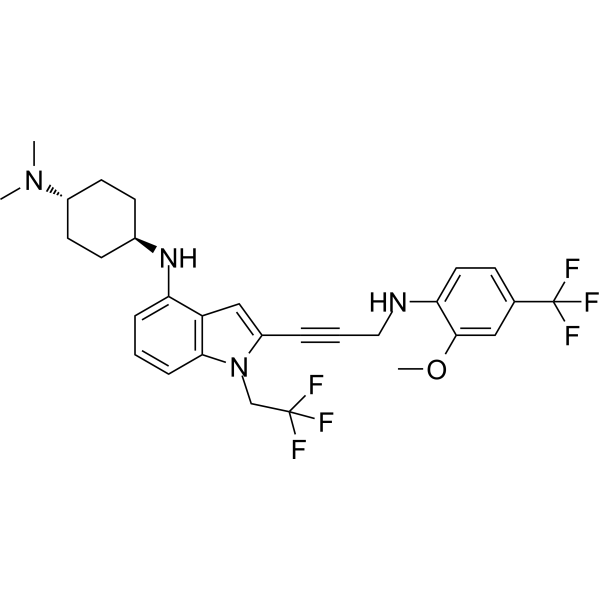
-
- HY-148402
-
|
|
MDM-2/p53
|
Cancer
|
|
p53 Activator 3 (compound 87A) is a potent p53 activator with a SC150 value of <0.05 mM. p53 Activator 3 can bind to mutant p53 and restore the ability of the p53 mutant to bind DNA. p53 Activator 3 shows anti-tumor activity . p53 Activator 3 is a click chemistry reagent, it contains an Alkyne group and can undergo copper-catalyzed azide-alkyne cycloaddition (CuAAc) with molecules containing Azide groups.
|
-
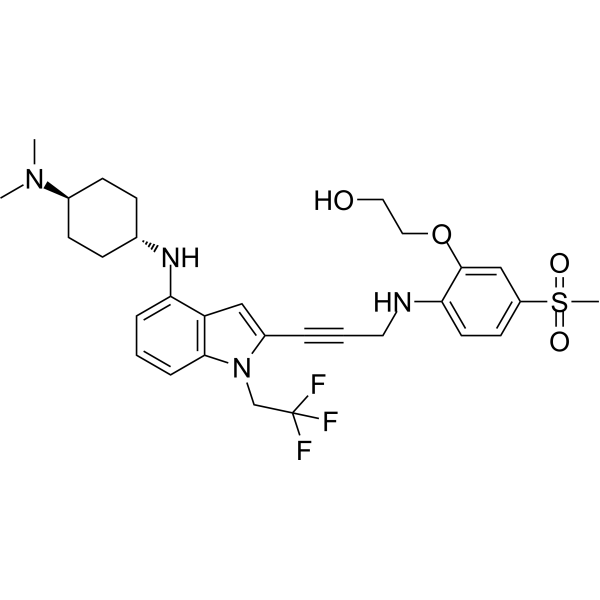
-
- HY-148416
-
|
|
MDM-2/p53
|
Cancer
|
|
p53 Activator 7 is a p53 mutation Y220C (MDM-2/p53) activator with an EC50 of 104 nM. p53 Activator 7 can bind to p53 mutant and restore its ability to bind DNA (WO2022213975A1; Example B-1) . p53 Activator 7 is a click chemistry reagent, it contains an Alkyne group and can undergo copper-catalyzed azide-alkyne cycloaddition (CuAAc) with molecules containing Azide groups.
|
-
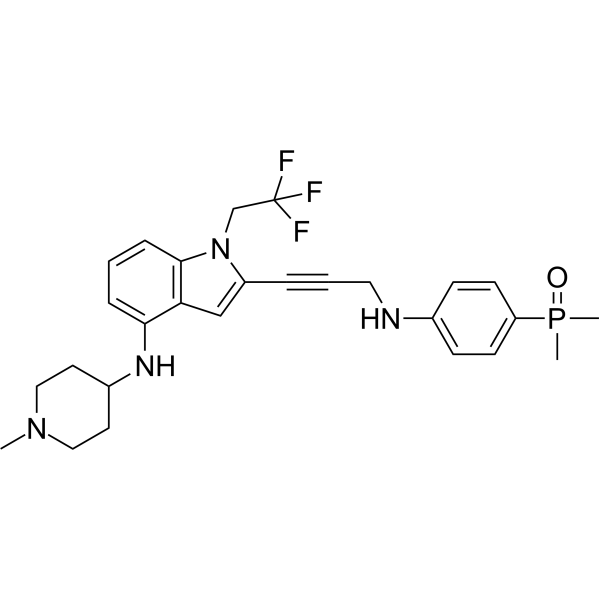
-
- HY-156919
-
|
|
MDM-2/p53
|
Cancer
|
|
p53 Activator 8 (compound 5) is a p53 activator. p53 Activator 8 has potent anti-proliferative activity against MCF7 breast cancer cell lines with an IC 50 value of 0.5 μM .
|
-
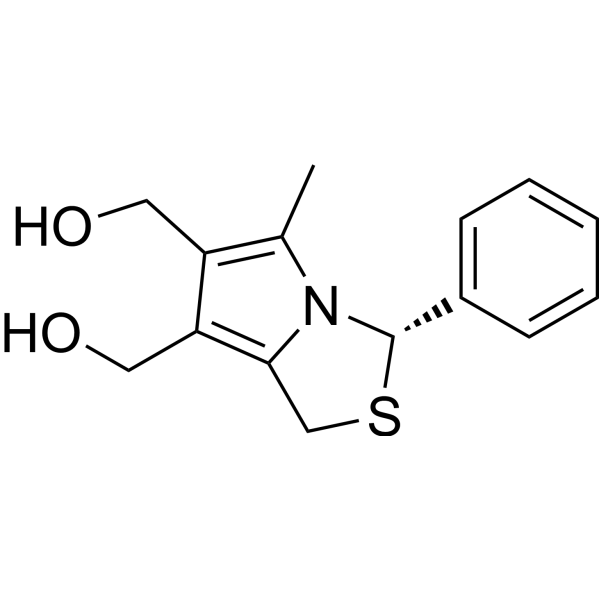
-
- HY-160450
-
|
|
MDM-2/p53
|
Cancer
|
|
p53 Activator 11 (compound A-1) is a potent p53 activator with an EC50 value of 0.478 µM for p53 (Y220C). p53 Activator 11 has the potential for the research of cancer .
|
-
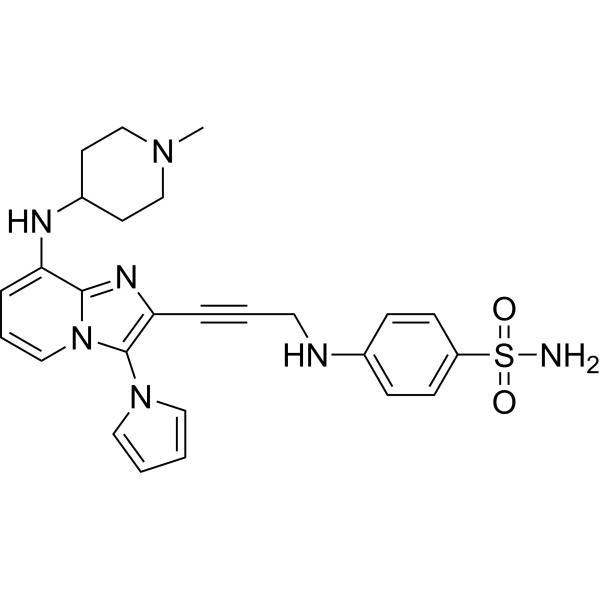
-
- HY-160449
-
|
|
MDM-2/p53
|
Cancer
|
|
p53 Activator 10 (Example C-2) is a compound that targets the y220c mutant of p53. p53 Activator 10 activation is involved in the downstream effects of tumor suppression .
|
-
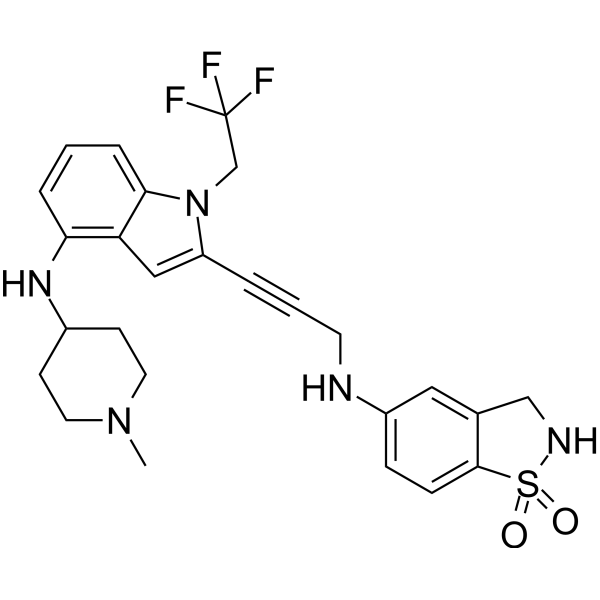
-
- HY-160448
-
|
|
Others
|
Cancer
|
|
p53 Activator 9 (example D-4) is a p53 activator with EC50 of 1.699μM .
|
-
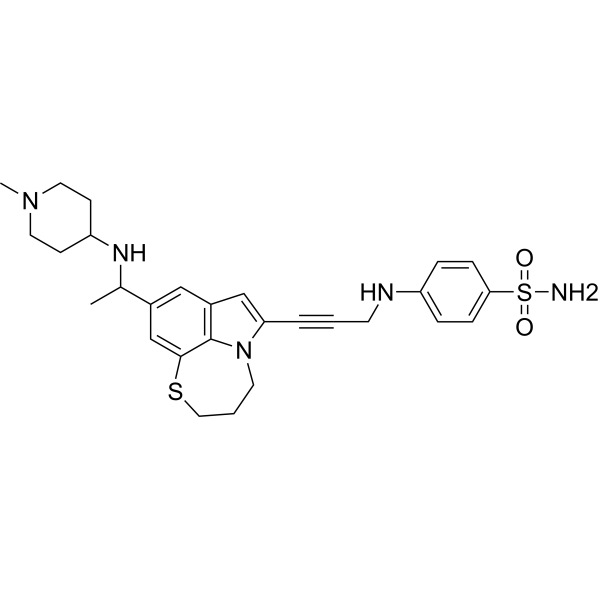
-
- HY-146095
-
|
|
MDM-2/p53
DNA/RNA Synthesis
Apoptosis
|
Cancer
|
|
p53 Activator 2 (compound 10ah) intercalats into DNA and results in significant DNA double-strand break.p53 Activator 2 increases the expression of p53, p-p53, CDK4, p21 to cause cell cycle arrest at G2/M phase.p53 Activator 2 induce apoptosis and significantly down-regulates the anti-apoptosis proteins Bcl-2, Bcl-xL and the levels of cyclin B1.p53 Activator 2 has anti-proliferation activity against MGC-803 cells, with an IC50 of 1.73 µM. p53 Activator 2 displays potent anticancer efficiency against MGC-803 xenograft tumors models .
|
-
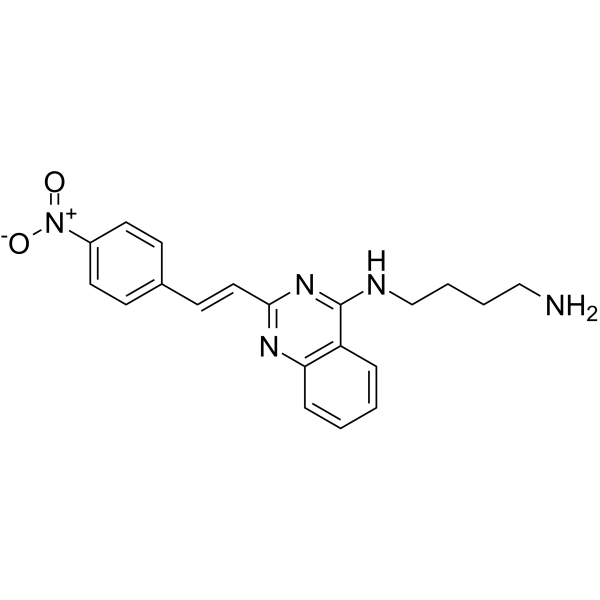
-
- HY-155974
-
|
|
MDM-2/p53
|
Cancer
|
|
MeOIstPyrd is an anti-skin cancer agent. MeOIstPyrd inhibits cell proliferation, migration, and spheroid formation by activating the mitochondrial intrinsic apoptotic pathway. MeOIstPyrd induces DNA damage. MeOIstPyrd activates p53, and increases the half-life of p53 and stabilizes p53 by phosphorylating it at ser15. MeOIstPyrd binds to MDM2 in the p53 sub-pocket and blocks p53-MDM2 interaction .
|
-
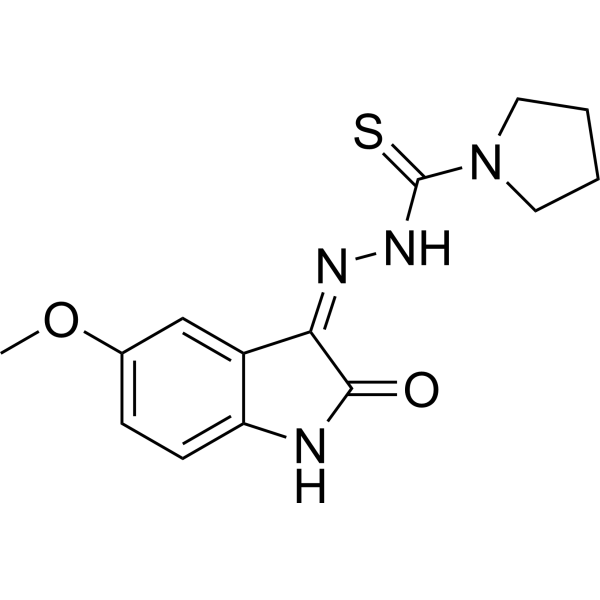
-
- HY-N12233
-
|
|
Apoptosis
MDM-2/p53
Reactive Oxygen Species
|
Cancer
|
|
Condurango glycoside A is an activator of p53. Condurango glycoside A initiates ROS generation and up-regulates p53 expression. Condurango glycoside A induces apoptosis and pre-mature senescence associated with DNA damage in HeLa cells .
|
-
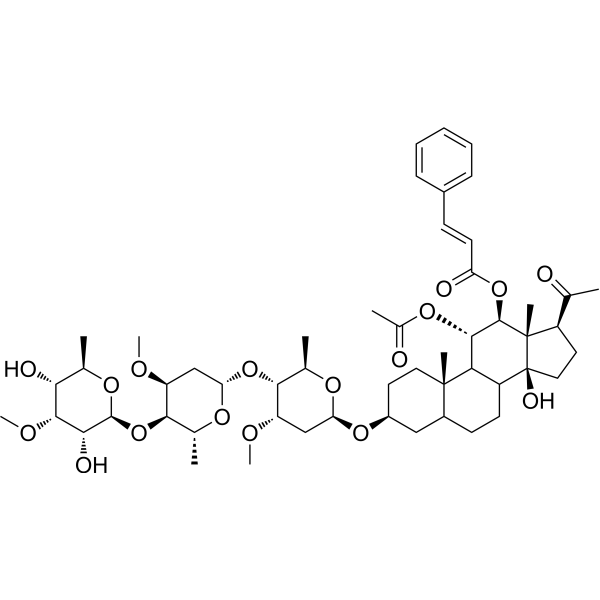
-
- HY-151170
-
|
|
MDM-2/p53
Apoptosis
|
Cancer
|
|
MDM2/4-p53-IN-2 (2q) is a potent dual MDM2/ MDM4 inhibitor and p53 activator with the IC50 values of 70.7 nM for MDM2- p53 and 81.4 nM for MDM4-p53 complexes. MDM2/4-p53-IN-2 regulates the cell cycle, induces cell apoptosis and has anticancer activity .
|
-
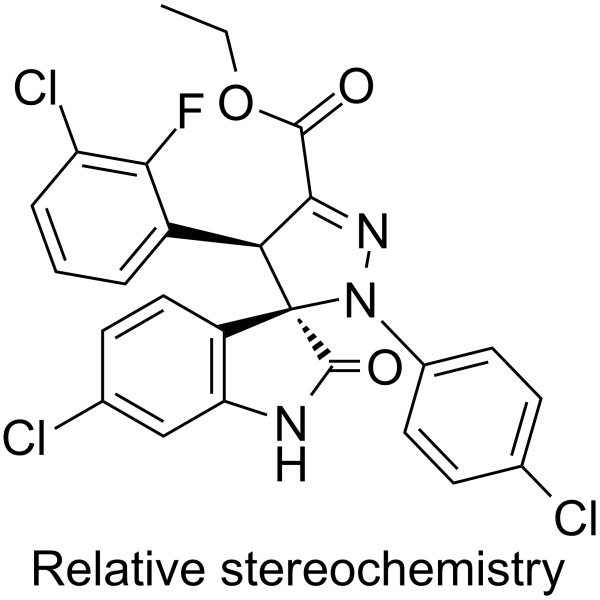
-
- HY-108636
-
|
|
MDM-2/p53
|
Cancer
|
|
RETRA is a mutant p53-dependent activator of p73 that suppresses mutant p53-bearing cancer cells. RETRA increases the expression level of p73, and a release of p73 from the blocking complex with mutant p53, which produces tumor-suppressor effects .
|
-
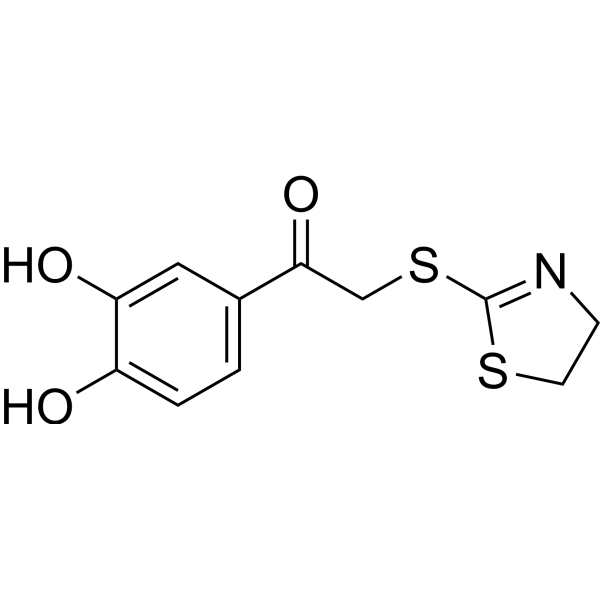
-
- HY-19339
-
-
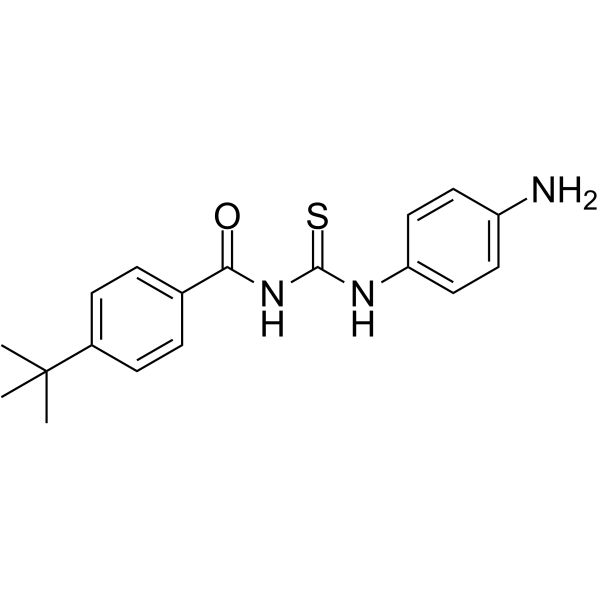
-
- HY-U00441
-
DPBQ
1 Publications Verification
|
MDM-2/p53
Apoptosis
|
Cancer
|
|
DPBQ activates p53 and triggers apoptosis in a polyploid-specific manner, but does not inhibit topoisomerase or bind DNA. DPBQ elicits expression and phosphorylation of p53 and this effect is specific to tetraploid cells .
|
-
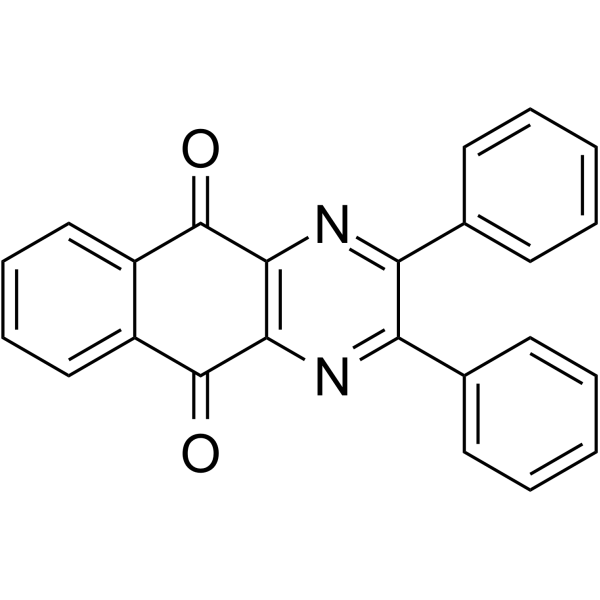
-
- HY-U00442
-
CTX1
1 Publications Verification
|
MDM-2/p53
E1/E2/E3 Enzyme
|
Cancer
|
|
CTX1 is a p53 activator that overcomes HdmX-mediated p53 repression. CTX1 exhibits potent anti-cancer activity in a mouse acute myeloid leukemia (AML) model system .
|
-
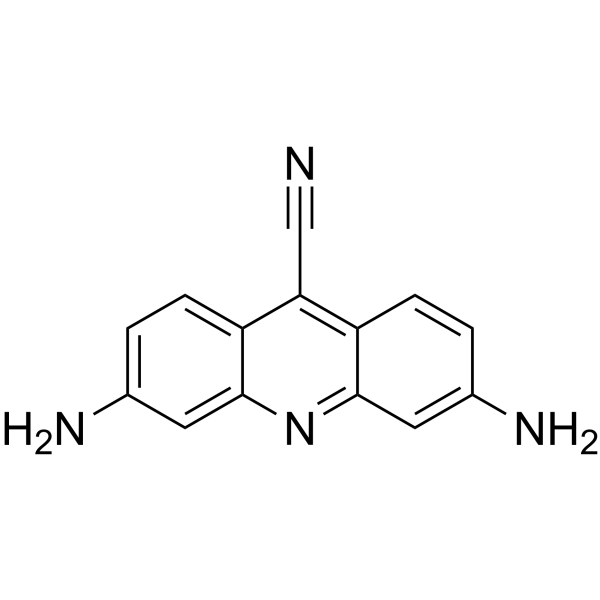
-
- HY-148408
-
|
|
Sirtuin
|
Cancer
|
|
SIRT2-IN-11 (AEM1) is a selective SIRT2 inhibitor with an IC50 value of 18.5 μM. SIRT2-IN-11 p53-dependently induces apoptosis, activates expression of CDKN1A, PUMA and NOXA, and increases acetylation of p53. SIRT2-IN-11 can be used for the research of p53-related cancers .
|
-
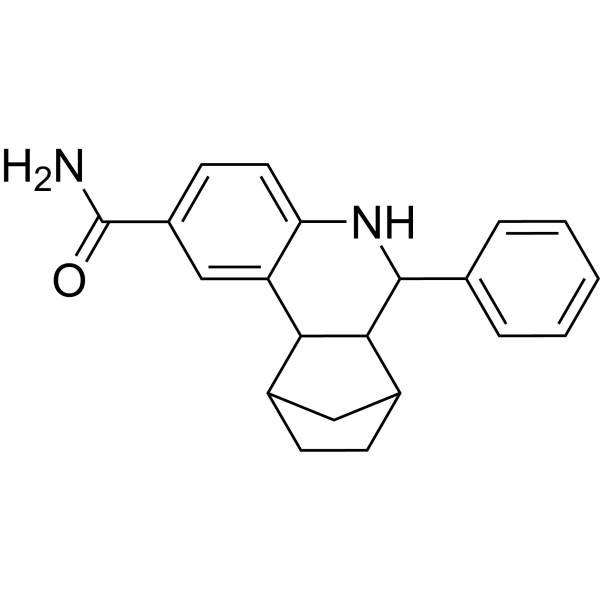
-
- HY-110088
-
|
|
MDM-2/p53
|
Cancer
|
|
SCH529074 is a potent and orally active p53 activator. SCH529074 binds specifically and conformation-dependently to p53 DBD ( DNA binding domain) with a Ki of 1-2 μM in a saturable manner. SCH529074 restores mutant p53 function and interrupts HDM2-mediated ubiquitination of wild Type p53. SCH529074 can be used for the study of non-small-cell lung carcinoma (NSCLC) .
|
-
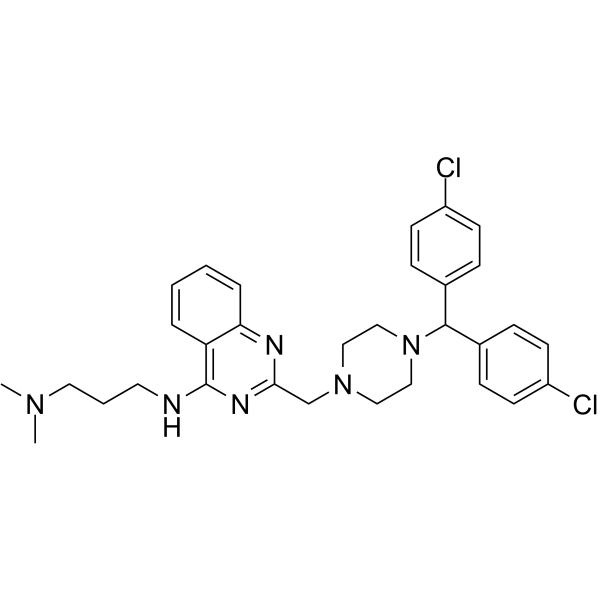
-
- HY-162247
-
|
|
MDM-2/p53
|
Cancer
|
|
MDM2-IN-26 (compound A3) is an MDM2 inhibitor that can activate the tumor suppressor function of p53 by blocking the interaction between MDM2 and p53 (MDM2 is the main negative regulator of p53). MDM2-IN-26 can be used for cancer research .
|
-
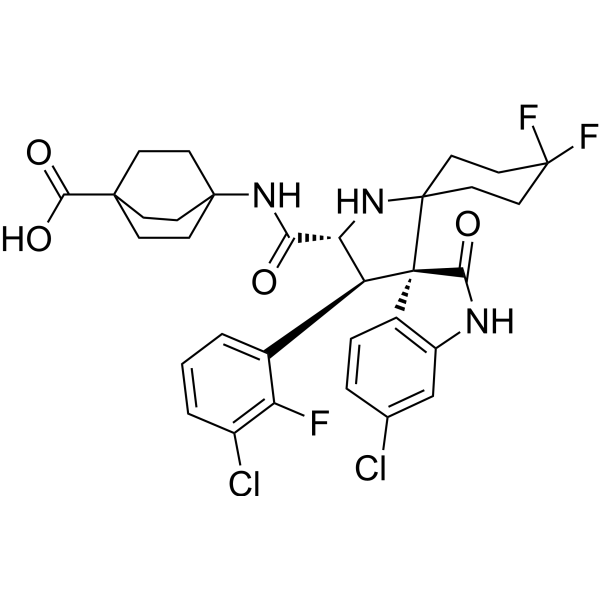
-
- HY-108638
-
|
|
MDM-2/p53
Apoptosis
|
Cancer
|
|
NSC 146109 hydrochloride is a small-molecule p53 activator that target MDMX and can be used for breast cancer research. NSC 146109 hydrochloride is a pseudourea derivative, promotes breast cancer cells to undergo apoptosis through activating p53 and inducing expression of proapoptotic genes .
|
-
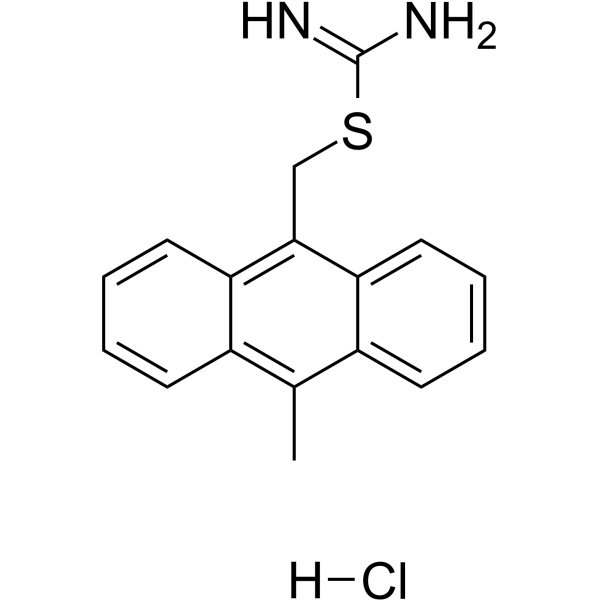
-
- HY-19896
-
COTI-2
2 Publications Verification
|
MDM-2/p53
Apoptosis
|
Cancer
|
|
COTI-2, an anti-cancer agent with low toxicity, is an orally available third generation activator of p53 mutant forms. COTI-2 acts both by reactivating mutant p53 and inhibiting the PI3K/AKT/mTOR pathway. COTI-2 induces apoptosis in multiple human tumor cell lines. COTI-2 exhibits antitumor activity in HNSCC through p53-dependent and -independent mechanisms. COTI-2 converts mutant p53 to wild-type conformation .
|
-
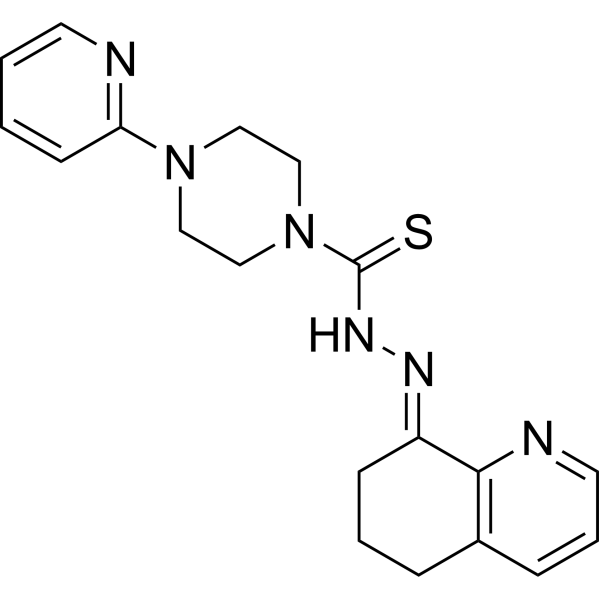
-
- HY-162432
-
|
|
MDM-2/p53
|
Cancer
|
|
MDM2-IN-27 targets MDM2 protein (Ki = 0.4 nM). MDM2-IN-27 activates the anti-tumor activity of p53 and induces apoptosis by blocking the negative regulation of p53 by MDM2 .
|
-
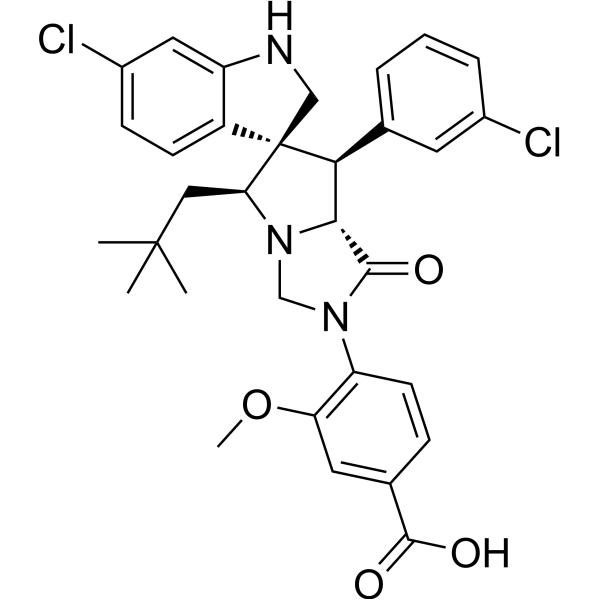
-
- HY-126849
-
|
SIN-1; Linsidomine
|
MDM-2/p53
|
Cancer
|
|
3-Morpholinosydnonimine (SIN-1; Linsidomine) is a spontaneous ROS/RNS generator and a peroxynitrite donor. 3-Morpholinosydnonimine inhibits hypertrophic chondrocytes activity and induces necrosis. 3-Morpholinosydnonimine induces p53-dependent apoptosis, induces p53 accumulation and activates MAPK phosphorylation .
|
-
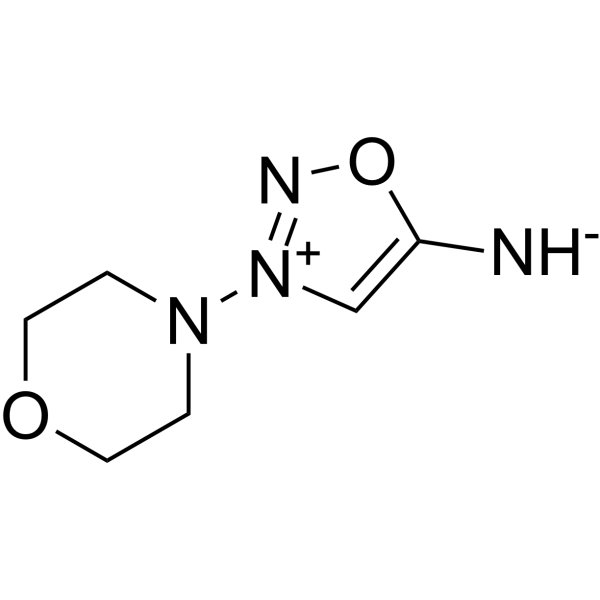
-
- HY-110315
-
|
|
Apoptosis
MDM-2/p53
Epigenetic Reader Domain
|
Cardiovascular Disease
|
|
Ischemin sodium is a CBP bromodomain inhibitor that inhibits p53 interaction with CBP and transcriptional activity in cells. Ischemin sodium salt inhibits p53-induced p21 activation with an IC50 value of 5 µM. Ischemin sodium salt also prevents apoptosis in ischemic cardiomyocytes. Ischemin sodium salt can be used in the study of cardiovascular diseases (such as myocardial ischemia) .
|
-
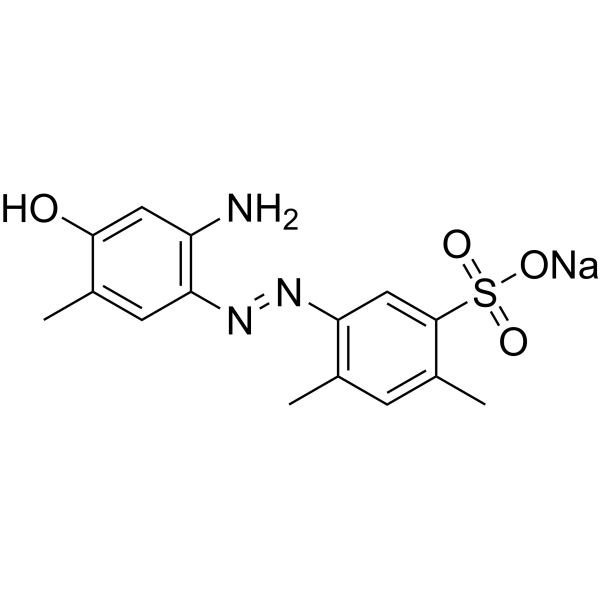
-
- HY-120084
-
|
|
Casein Kinase
|
Cancer
|
|
BTX161, a Thalidomide analog, is a potent CKIα degrader. BTX161 mediates degradation of CKIα better than Lenalidomide in human AML cells and activates DNA damage response (DDR) and p53, while stabilizing the p53 antagonist MDM2 .
|
-
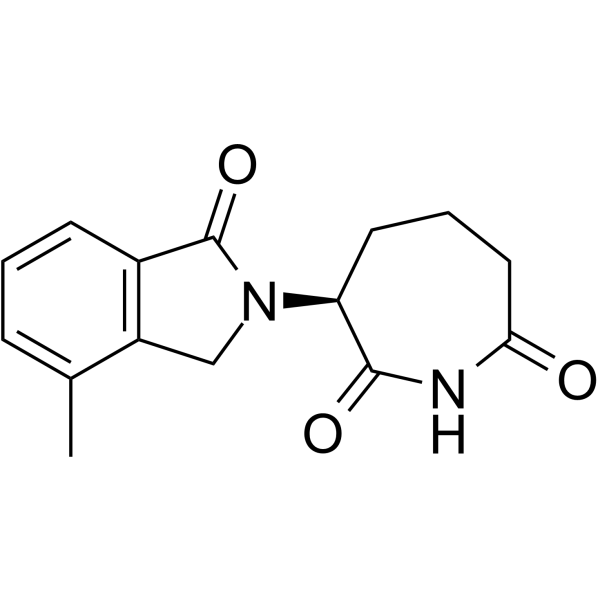
-
- HY-100354
-
|
|
|
|
|
C16-Ceramide is a natural small molecule activating p53 through the direct and selective binding .
|
-
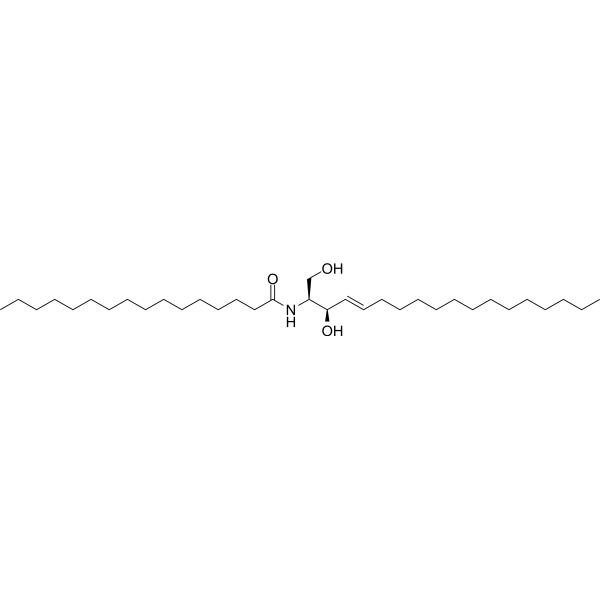
-
- HY-13423
-
|
|
MDM-2/p53
Dihydroorotate Dehydrogenase
Sirtuin
Autophagy
|
Cancer
|
|
Tenovin-1, a p53 activator, protects p53 from MDM2-mediated degradation. Tenovin-1 acts through inhibition of the protein-deacetylating activities of SirT1 and SirT2. Tenovin-1 is also a dihydroorotate dehydrogenase (DHODH) inhibitor .
|
-
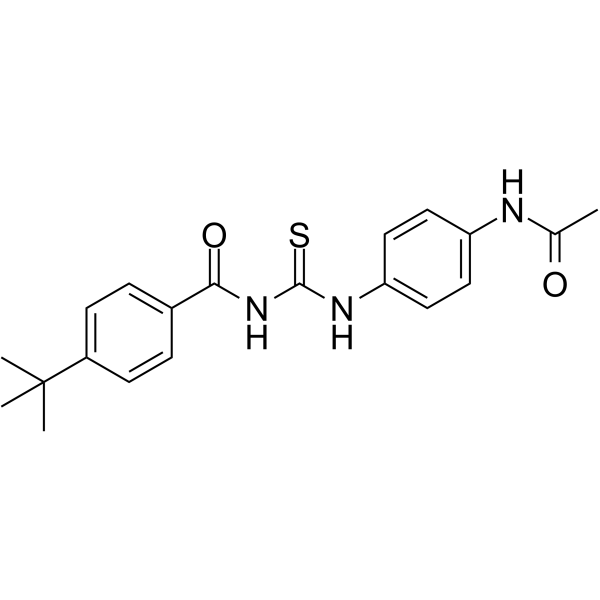
-
- HY-13811
-
|
|
E1/E2/E3 Enzyme
Apoptosis
|
Cancer
|
|
NSC697923 is a potent UBE2N (ubiquitin-conjugating enzyme E2 N, Ubc13) inhibitor. NSC697923 induces neuroblastoma (NB) cell death via promoting nuclear importation of p53 in p53 wild-type NB cells. NSC697923 also induces cell death in p53 mutant NB cells by activation of JNK-mediated apoptotic pathway. NSC697923 inhibits DNA damage and NF-κB signaling. Antitumor activity .
|
-
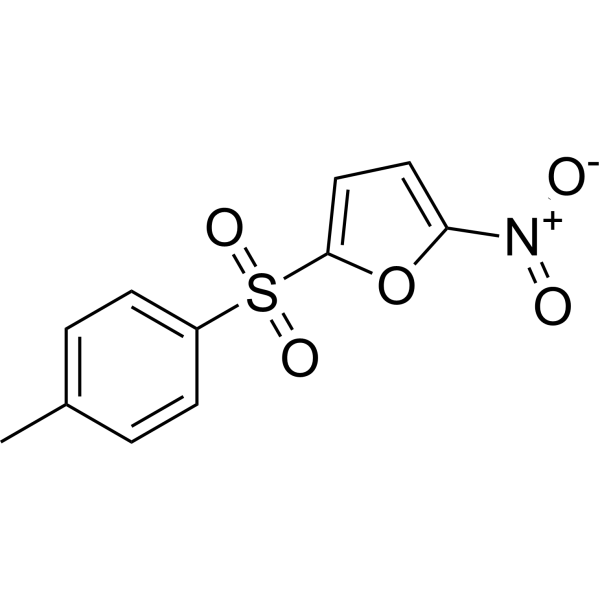
-
- HY-125858
-
MI-1061
1 Publications Verification
|
MDM-2/p53
E1/E2/E3 Enzyme
Apoptosis
|
Cancer
|
|
MI-1061 is a potent, orally bioavailable, and chemically stable MDM2 (MDM2-p53 interaction) inhibitor (IC50=4.4 nM; Ki=0.16 nM). MI-1061 potently activates p53 and induces apoptosis in the SJSA-1 xenograft tumor tissue in mice. Anti-tumor activity .
|
-
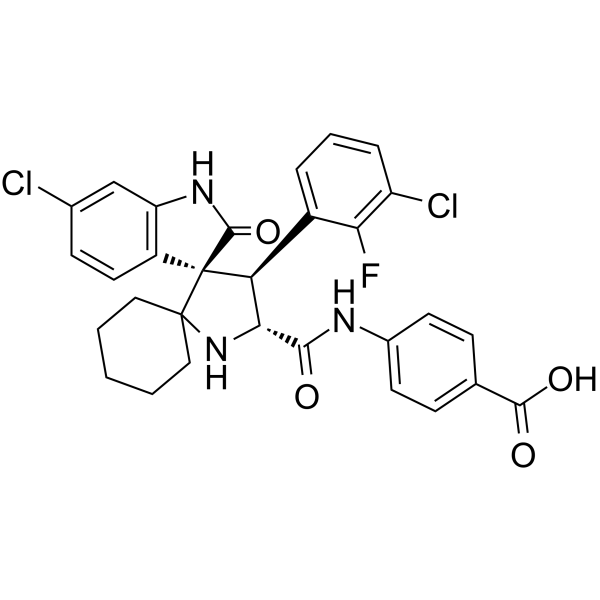
-
- HY-15869
-
|
INZ
|
Sirtuin
MDM-2/p53
|
Cancer
|
|
Inauhzin is a dual SirT1/IMPDH2 inhibitor, and acts as an activator p53, used in the research of cancer.
|
-
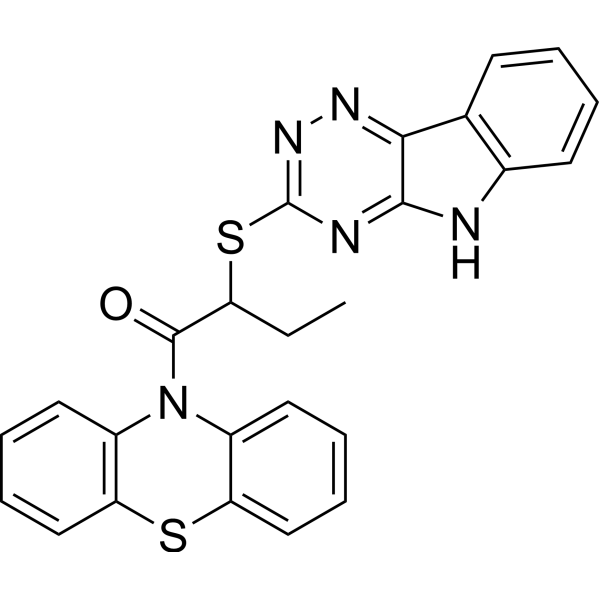
-
- HY-125858A
-
|
|
MDM-2/p53
E1/E2/E3 Enzyme
Apoptosis
|
Cancer
|
|
MI-1061 TFA is a potent, orally bioavailable, and chemically stable MDM2 (MDM2-p53 interaction) inhibitor (IC50=4.4 nM; Ki=0.16 nM). MI-1061 TFA potently activates p53 and induces apoptosis in the SJSA-1 xenograft tumor tissue in mice. Anti-tumor activity .
|
-
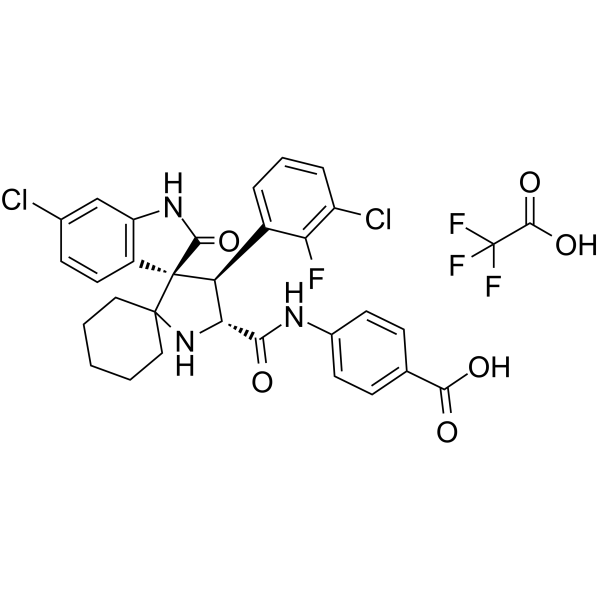
-
- HY-N4225
-
|
|
Adrenergic Receptor
|
Endocrinology
Cancer
|
|
Aaptamine, a spongean alkaloid isolated from a sea sponge Aaptos aaptos, is a competitive antagonist of α-adrenoceptor and activates the p21 promoter in a p53-independent manner .
|
-
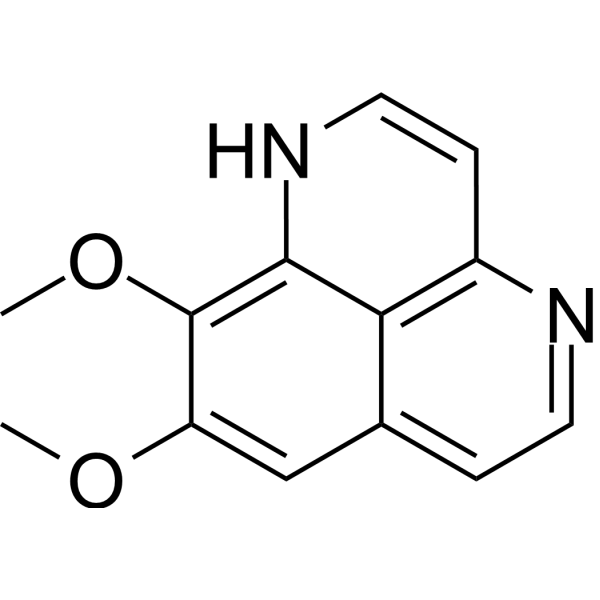
-
- HY-P1562
-
|
|
Bcl-2 Family
|
Cancer
|
|
PUMA BH3 is a p53 upregulated modulator of apoptosis (PUMA) BH3 domain peptide, acts as a direct activator of Bak, with a Kd of 26 nM.
|
-
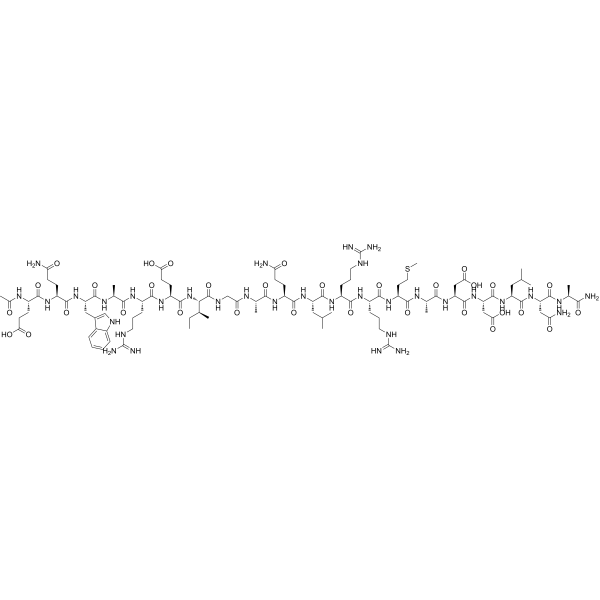
-
- HY-14714
-
|
XI-006
|
MDM-2/p53
|
Cancer
|
|
NSC-207895 (XI-006), a DNA damaging agent, is an anticancer agent and p53 activator .
|
-
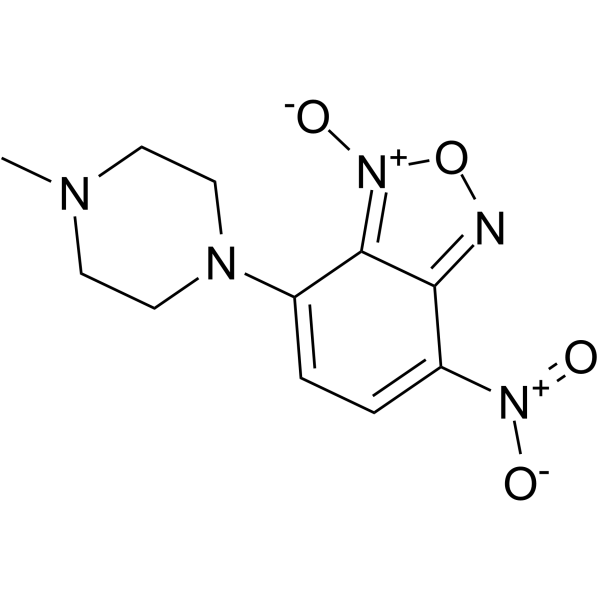
-
- HY-P1562A
-
|
|
Bcl-2 Family
|
Cancer
|
|
PUMA BH3 TFA is a p53 upregulated modulator of apoptosis (PUMA) BH3 domain peptide, acts as a direct activator of Bak, with a Kd of 26 nM .
|
-
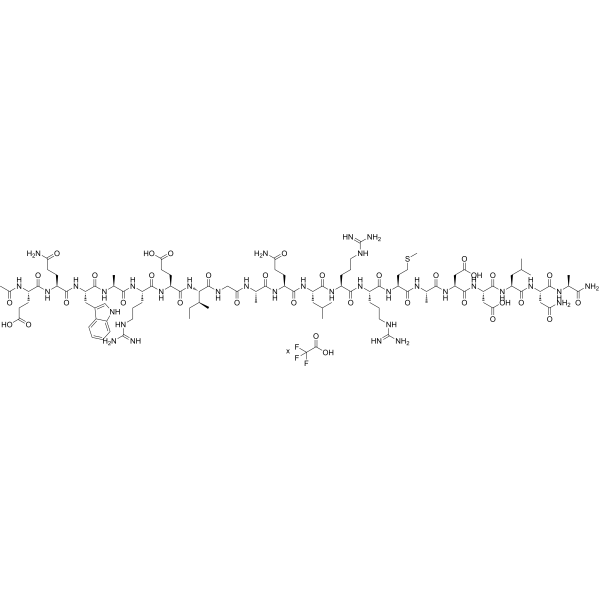
-
- HY-19634
-
|
|
Sirtuin
|
Cancer
|
|
YK-3-237, a SIRT1 activator, targets mutant p53. YK-3-237 inhibits the proliferation of triple-negative breast cancer cells .
|
-
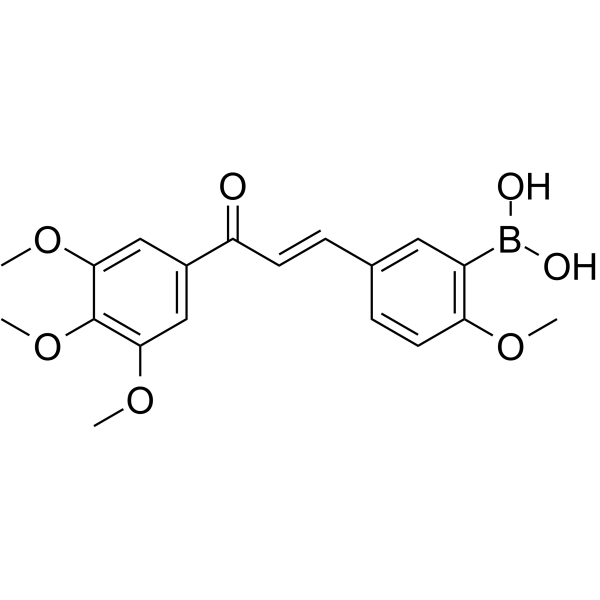
-
- HY-103640
-
|
WR-1065 dihydrochloride
|
MDM-2/p53
|
Cancer
|
|
Amifostine thiol (WR-1065) dihydrochloride can protect normal tissues from the toxic effects of certain cancer agents and activate p53 through a JNK-dependent signaling pathway.
|
-
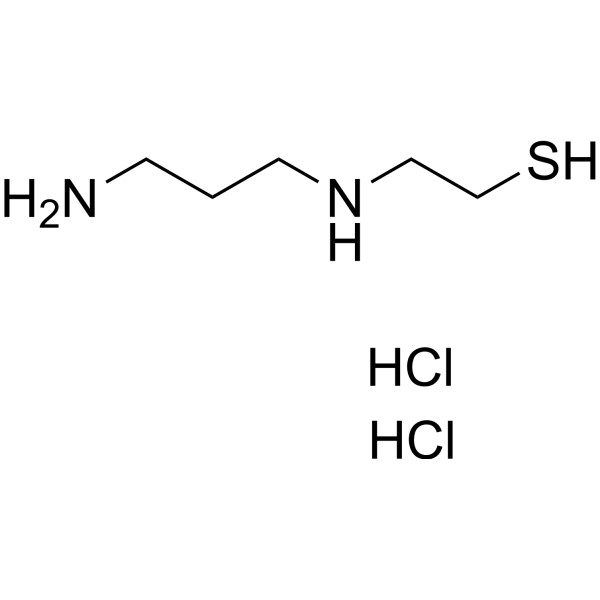
-
- HY-W016181
-
|
2-Phenylhydroquinone
|
MDM-2/p53
ERK
p38 MAPK
|
Inflammation/Immunology
|
|
Phenylhydroquinone (PHQ) is an orally active thymic atrophy inducer which can up-regulate apoptosis through activation of p53. PHQ can be used for research of thymic atrophy .
|
-
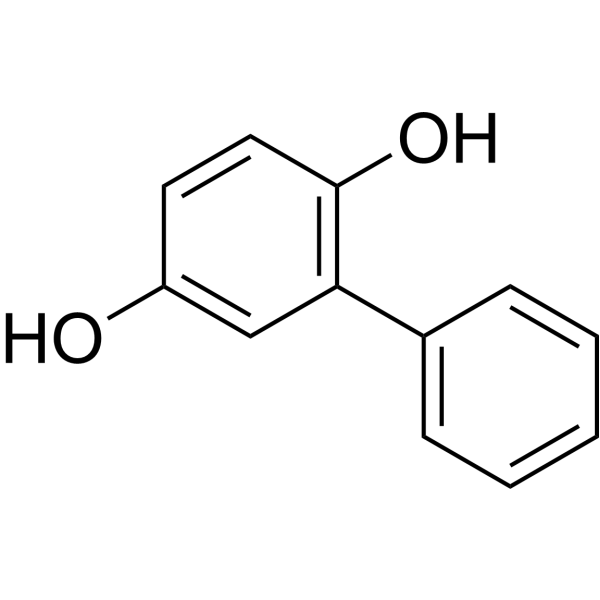
-
- HY-13735B
-
|
Mepacrine hydrochloride hydrate; SN-390 hydrochloride hydrate
|
Parasite
Apoptosis
Autophagy
Mitophagy
|
Infection
Cancer
|
|
Quinacrine hydrochloride hydrate (Mepacrine hydrochloride hydrate) is an antimalarial agent, which possess anticancer effect both in vitro and vivo. Quinacrine hydrochloride hydrate suppresses NF-κB and activates p53 signaling, which results in the induction of the apoptosis .
|
-
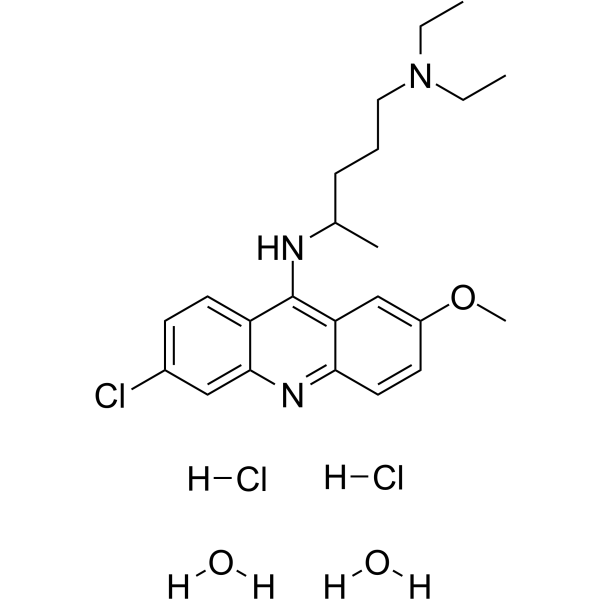
-
- HY-163083
-
|
|
MDM-2/p53
Apoptosis
|
Cancer
|
|
JN122, a spiroindoline-containing molecule, is a MDM2 inhibitor. JN122 Inhibits MDM2/p53 protein–protein interaction and exerts robust in vivo antitumor efficacy. JN122 has antiproliferative activity in HCT-116 cells and HEK-293 cells with IC50 values of 39.6 nM and 4.28μM, respectively. JN122 can promote activation of p53 and its target genes, inhibited cell cycle progression, and induced cell apoptosis .
|
-
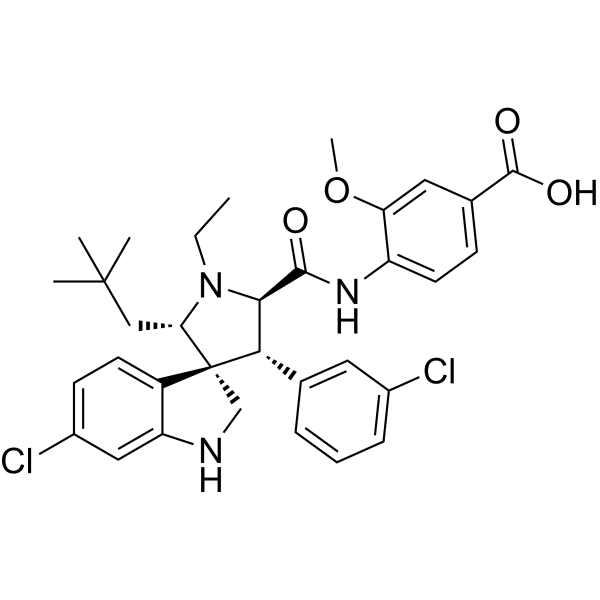
-
- HY-N7526
-
|
DHNQ; 5,8-Dihydroxy-1,4-naphthoquinone
|
Apoptosis
|
Neurological Disease
Cancer
|
|
Naphthazarin (DHNQ) is a naturally occurring compound. Naphthazarin is effective by various cellular mechanisms including oxidative stress, activation of mitochondrial apoptosis-inducing factor (AIF), depolymerization of microtubules, interference with lysosomal function and p53-dependent p21 activation. Naphthazarin triggers apoptosis and has anti-tumor effects .
|
-
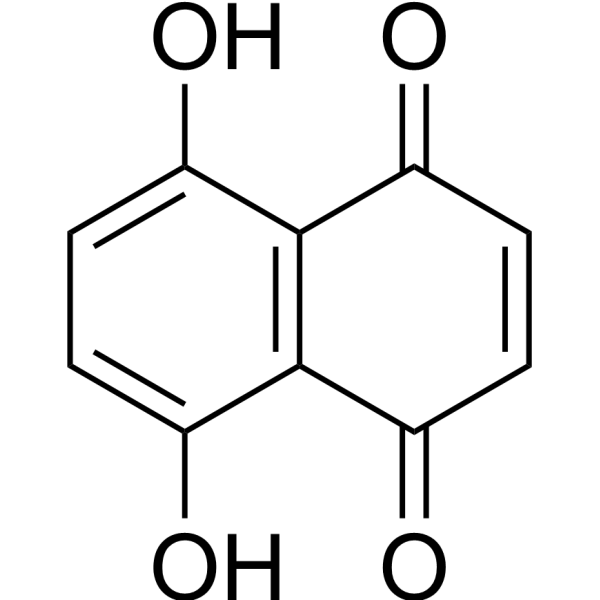
-
- HY-18935A
-
|
Curaxin-137 hydrochloride; CBL-C137 hydrochloride
|
MDM-2/p53
NF-κB
|
Cancer
|
|
CBL0137 hydrochloride is an inhibitor of the histone chaperone, FACT. CBL0137 hydrochloride can also activate p53 and inhibits NF-κB with EC50s of 0.37 and 0.47 µM, respectively.
|
-
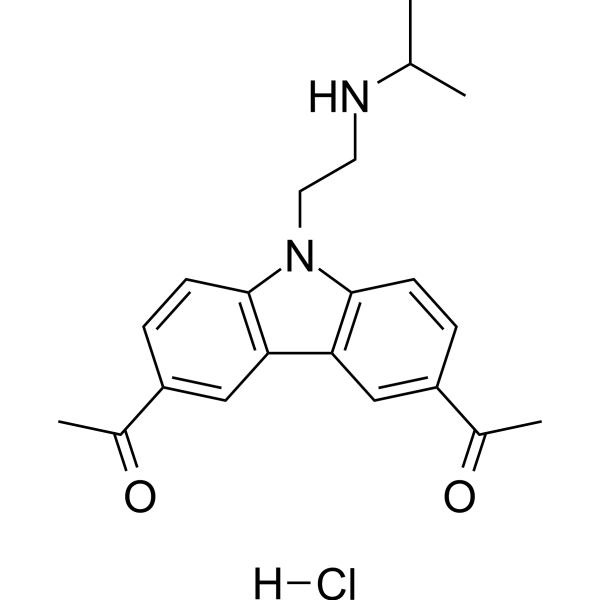
-
- HY-16271
-
|
4-Isothioureidobutyronitrile hydrochloride; thioureidobutyronitrile hydrochloride; thioureido butyronitrile hydrochloride
|
MDM-2/p53
Apoptosis
|
Cancer
|
|
Kevetrin hydrochloride is a potent activator of p53, induces apoptosis in TP53 wild-type and mutant acute myeloid leukemia cells. Kevetrin a preferential cytotoxic activity against blast cells .
|
-
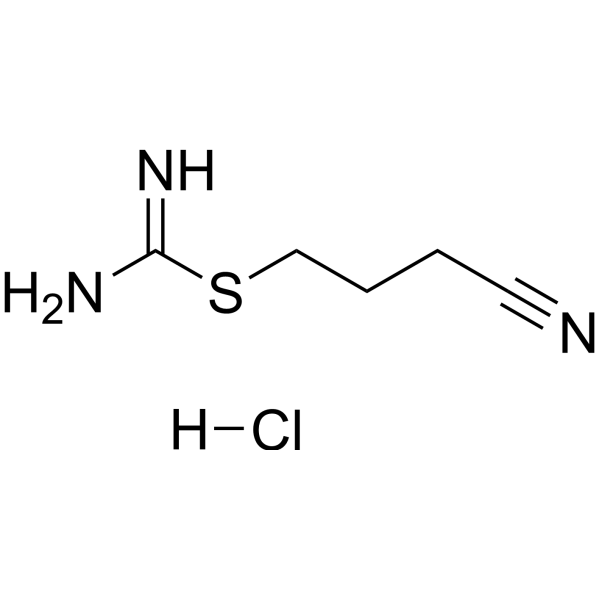
-
- HY-13735A
-
|
Mepacrine dihydrochloride; SN-390 dihydrochloride
|
Parasite
Apoptosis
Autophagy
Mitophagy
|
Infection
Cancer
|
|
Quinacrine (Mepacrine) dihydrochloride is an orally bioavailable antimalarial agent, which possess anticancer effect both in vitro and vivo. Quinacrine dihydrochloride suppresses NF-κB and activate p53 signaling, which results in the induction of the apoptosis .
|
-
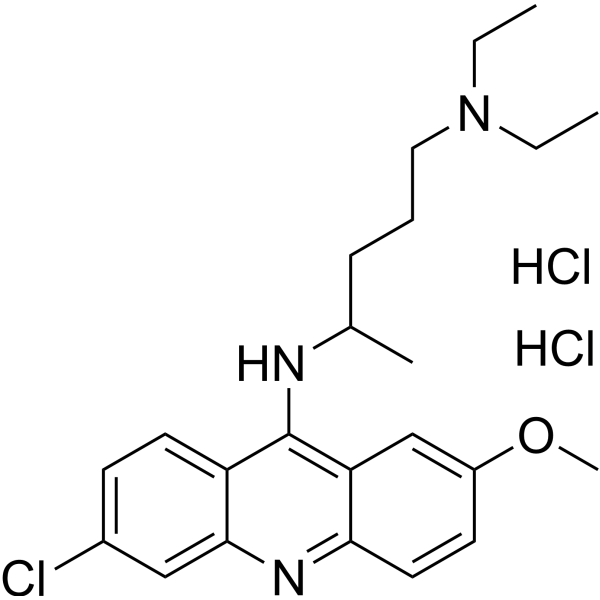
-
- HY-130437
-
|
|
MDM-2/p53
TGF-β Receptor
Caspase
|
Infection
Metabolic Disease
|
|
p-nitro-Pifithrin-α, a cell-permeable analog of pifithrin-α, is a potent p53 inhibitor. p-nitro-Pifithrin-α suppresses p53-mediated TGF-β1 expression in HK-2 cells. p-nitro-Pifithrin-α inhibits the activation of caspase-3 by Zika virus (ZIKV) strains. p-nitro-Pifithrin-α attenuates steatosis and liver injury in mice fed a high-fat diet [4].
non-alcoholic fatty liver disease .
|
-
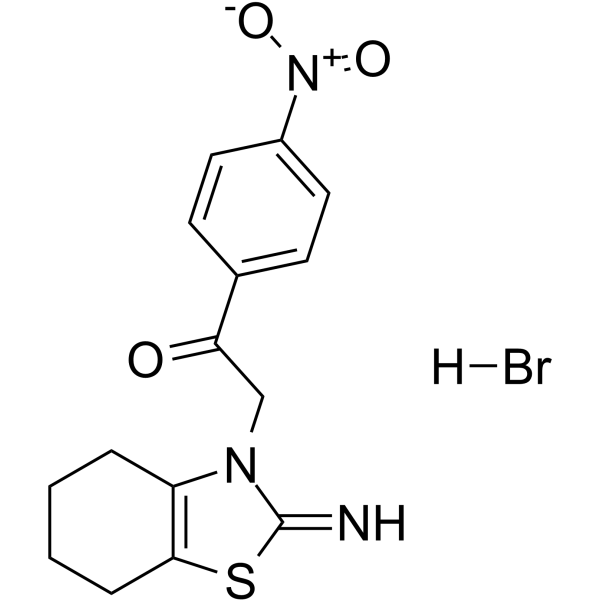
-
- HY-16271S
-
|
|
Isotope-Labeled Compounds
MDM-2/p53
|
Cancer
|
|
Kevetrin (hydrochloride)- 13C2, 15N3 is the 13C-labeled and 15N-labeled Kevetrin (hydrochloride). Kevetrin hydrochloride is a small molecule and activator of the tumor suppressor protein p53, with potential antineoplastic activity.
|
-
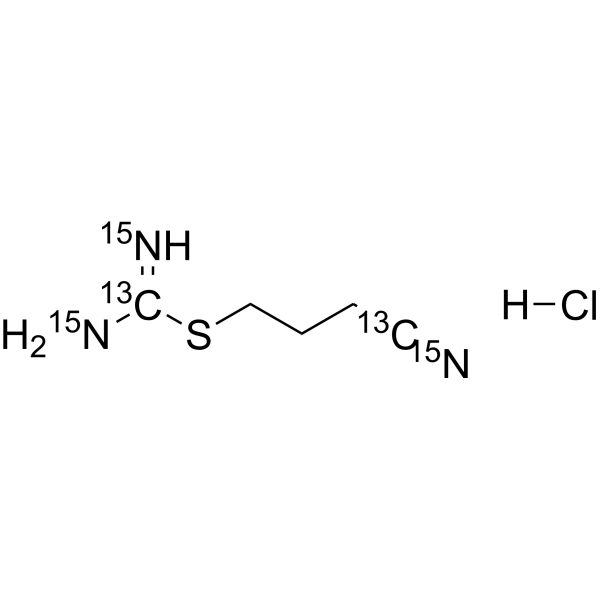
-
- HY-125858B
-
|
|
Others
|
Others
|
|
(S,R,S)-MI-1061 is the isomer of MI-1061(HY-125858). (S,R,S)-MI-1061 can used to synthesize Antibody-Drug Conjugates (ADCs). MI-1061 is a potent, orally bioavailable, and chemically stable MDM2 (MDM2-p53 interaction) inhibitor (IC50=4.4 nM; Ki=0.16 nM). MI-1061 potently activates p53 and induces apoptosis in the SJSA-1 xenograft tumor tissue in mice. Anti-tumor activity .
|
-
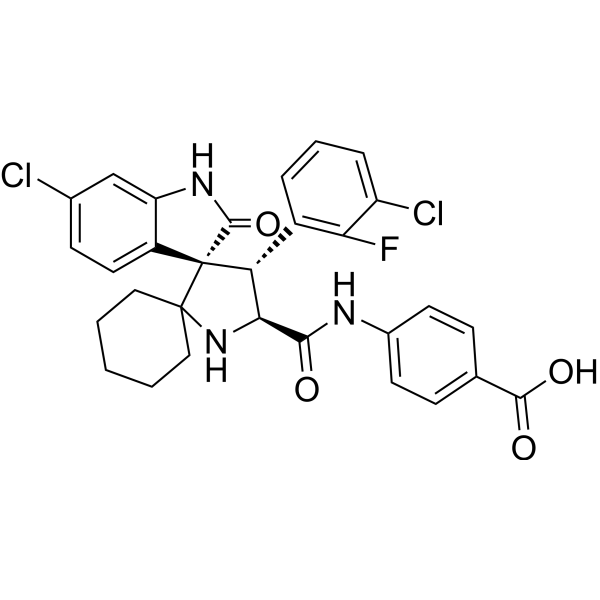
-
- HY-108433
-
|
Carnitine palmitoyltransferase 2
|
Apoptosis
MDM-2/p53
|
Metabolic Disease
Cancer
|
|
CPT2 (Carnitine palmitoyltransferase 2), an enzyme that participates in fatty acid oxidation, also is a colorectal cancer (CRC) prognostic biomarker. CPT2 overexpression can activate p-p53 to increase p53 expression, thereby inhibiting tumor proliferation and promoting apoptosis. CPT2 deficiency results in the most common inherited disorder of long-chain fatty acid oxidation affecting skeletal muscle. Downregulation of CPT2 is also highly correlated with the progression of various cancers and has potential for cancer research .
|
-

-
- HY-N2693
-
-
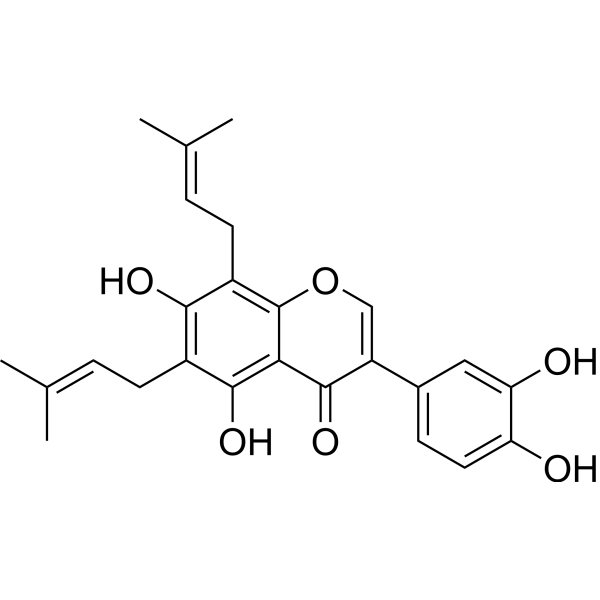
-
- HY-137864
-
|
WR-1065
|
MDM-2/p53
|
Cancer
|
|
Amifostine thiol (WR-1065) is an active metabolite of the cytoprotector Amifostine (HY-B0639). Amifostine thiol is a cytoprotective agent with radioprotective abilities. Amifostine thiol activates p53 through a JNK-dependent signaling pathway .
|
-
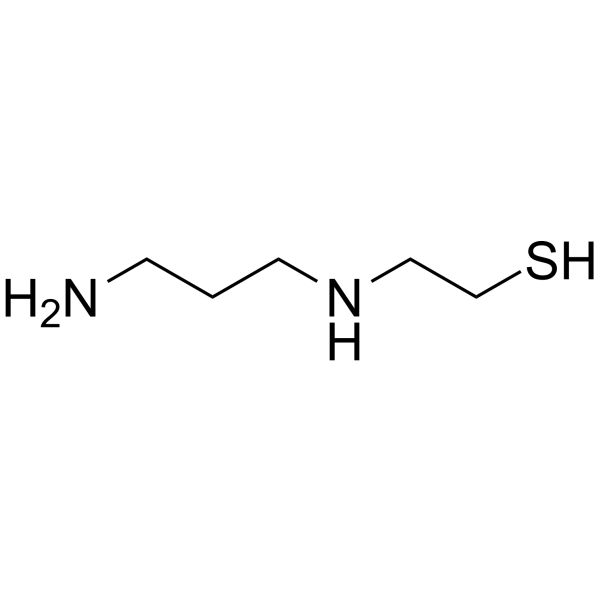
-
- HY-N2602
-
|
|
MDM-2/p53
|
Cancer
|
|
Sanggenol L induces caspase-dependent and caspase-independent apoptosis in melanoma skin cancer cells . Sanggenol L induces of apoptosis via suppression of PI3K/Akt/mTOR signaling and cell cycle arrest via activation of p53 in p
|
-
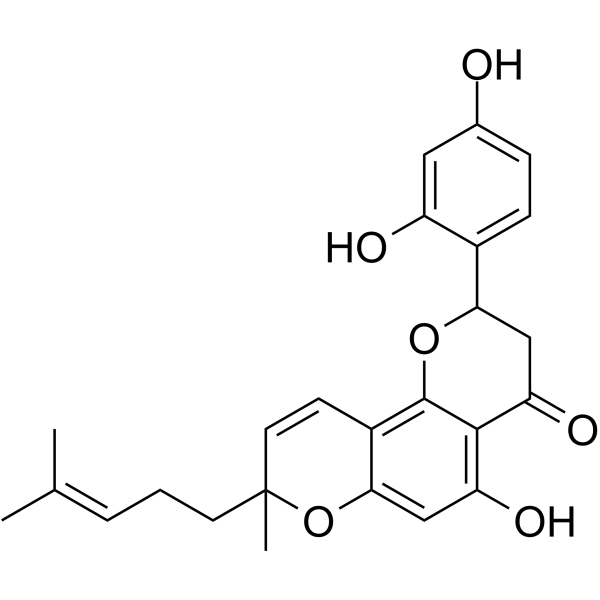
- HY-147783
-
|
|
MDM-2/p53
|
Cancer
|
|
Anticancer agent 68 is (Compound 12) is an anti-cancer agent. Anticancer agent 68 arrests the cells at the G2/M phase and induces programmed cell death. Anticancer agent 68 induces upregulation of tumor suppression via activation of p53 & PTEN .
|
-
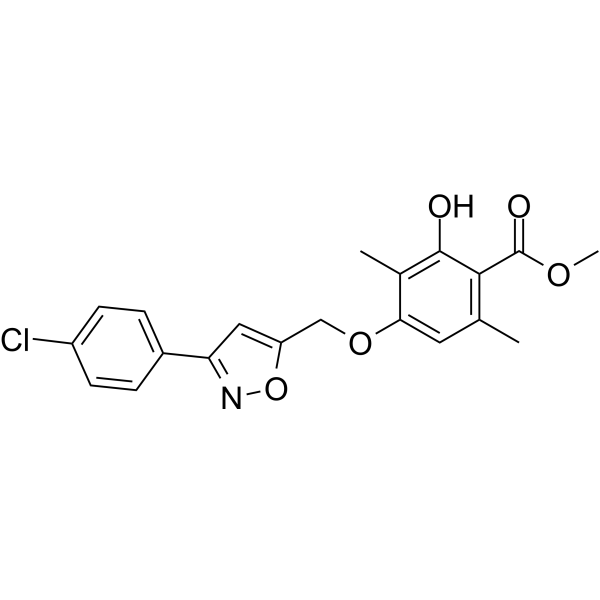
- HY-15186
-
Ipatasertib
Maximum Cited Publications
35 Publications Verification
GDC-0068; RG7440
|
Organoid
Akt
Apoptosis
|
Cancer
|
|
Ipatasertib (GDC-0068) is an orally active, highly selective and ATP-competitive pan-Akt inhibitor with IC50 values of 5, 18, 8 nM for Akt1/2/3, respectively. Ipatasertib synchronously activates FoxO3a and NF-κB through inhibition of Akt leading to p53-independent activation of PUMA. Ipatasertib also induces apoptosis in cancer cells and inhibits tumor growth in xenograft mouse models .
|
-
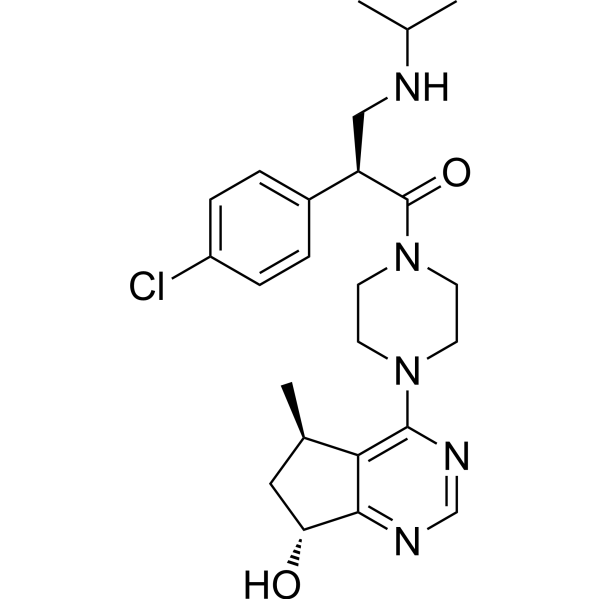
- HY-W011434
-
|
TGIC; Teroxirone
|
MDM-2/p53
Apoptosis
|
Inflammation/Immunology
Cancer
|
|
Triglycidyl isocyanurate (TGIC; Teroxirone) is a triazene triepoxide with antiangiogenic and antineoplastic activities. Triglycidyl isocyanurate inhibits the growth of non-small-cell-lung cancer cells via p53 activation. Triglycidyl isocyanurate induces cell apoptosis. Triglycidyl isocyanurate can be used for cancer research .
|
-
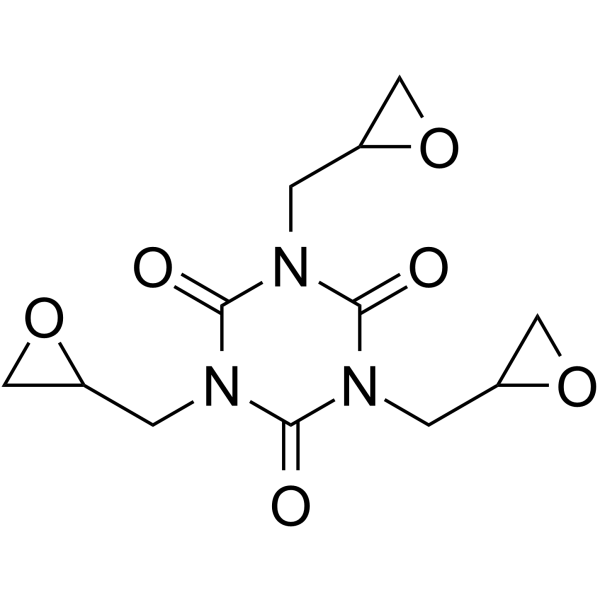
- HY-131031
-
|
|
DNA Alkylator/Crosslinker
|
Cancer
|
|
KCC-07 is a potent, selective and brain-penetrant MBD2 (methyl-CpG-binding domain protein 2) inhibitor. KCC-07 prevents binding of MBD2 to methylated DNA and activates brain specific angiogenesis inhibitor 1 (BAI1) inducing anti-proliferative BAI1/p53/p21 signaling. Anticancer activity .
|
-
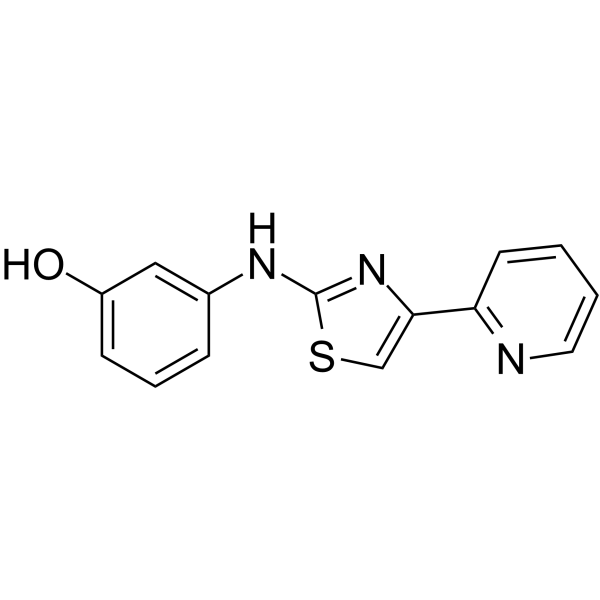
- HY-139149
-
|
|
Histone Acetyltransferase
|
Cancer
|
|
NiCur is a potent and selective CBP histone acetyltransferase (HAT) inhibitor with an IC50 value of 0.35 μΜ. NiCur, which blocks CBP HAT activity and downregulates p53 activation upon genotoxic stress. NiCur can be used for performing mechanistic studies without affecting the expression of target proteins .
|
-
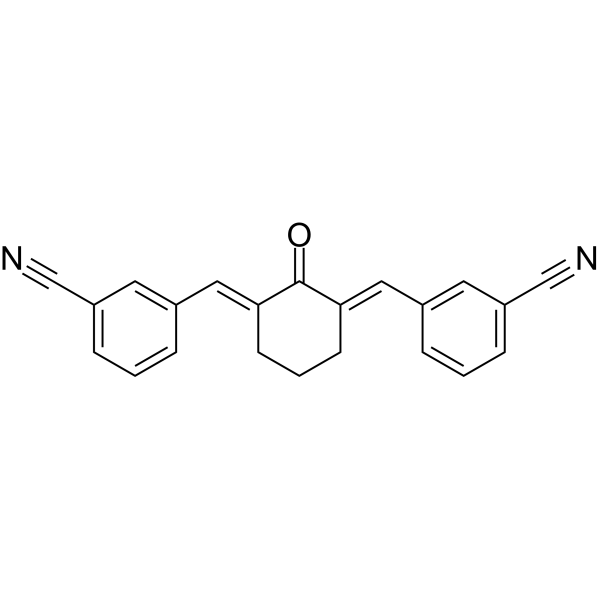
- HY-155532
-
|
|
Biochemical Assay Reagents
|
Cancer
|
|
10m/ZS44 is a blood-brain barrier-permeable Glioblastoma (GBM) inhibitor. 10m/ZS44 significantly inhibits GBM tumor growth in a mouse xenograft model. 10m/ZS44 also activates the SIRT1/p53-mediated apoptosis pathway, thereby inhibiting the proliferation of U251 cells .
|
-
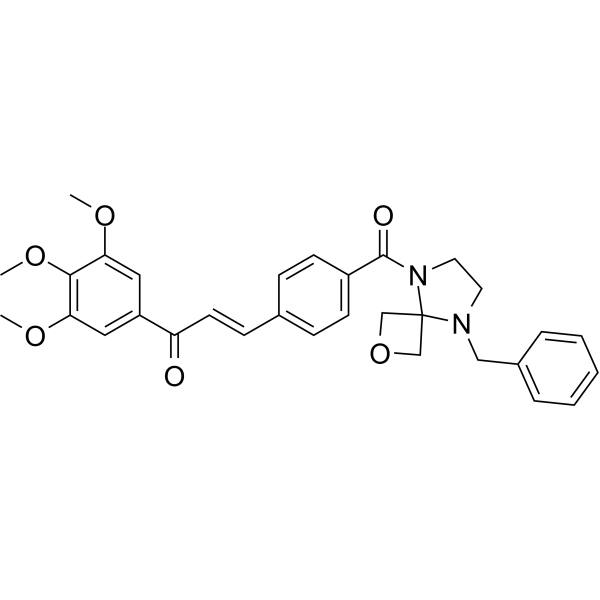
- HY-N0636
-
|
|
Apoptosis
|
Cancer
|
|
Eriocitrin is a flavonoid isolated from lemons that is a powerful antioxidant. Eriocitrin inhibits the proliferation of liver cancer cells by arresting the cell cycle in the S phase by upregulating p53, cyclin A, cyclin D3 and CDK6. Eriocitrin triggers apoptosis by activating intrinsic signaling pathways involving mitochondria .
|
-
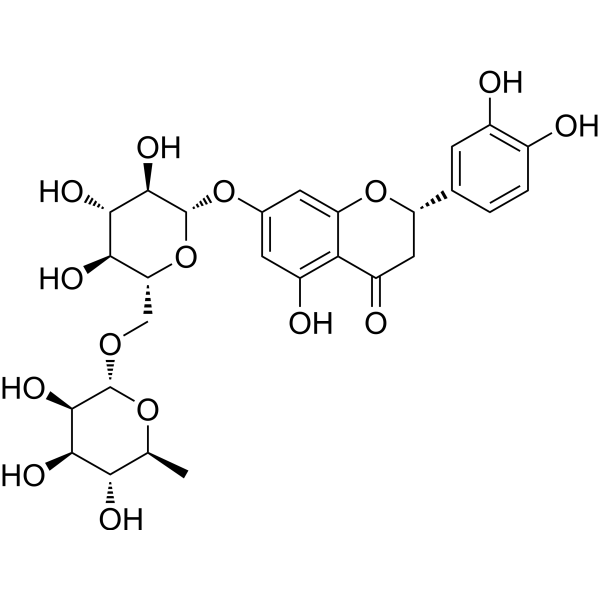
- HY-18935
-
|
Curaxin 137; CBL-C137
|
|
|
|
CBL0137, a curaxin compound, is a histone chaperone facilitates chromatin transcription (FACT) inhibitor. CBL0137 downregulates NF-?B and activates p53. CBL0137 restores both histone H3 acetylation and trimethylation. CBL0137 is an anticancer agent. CBL0137 induces cancer cell apoptosis .
|
-
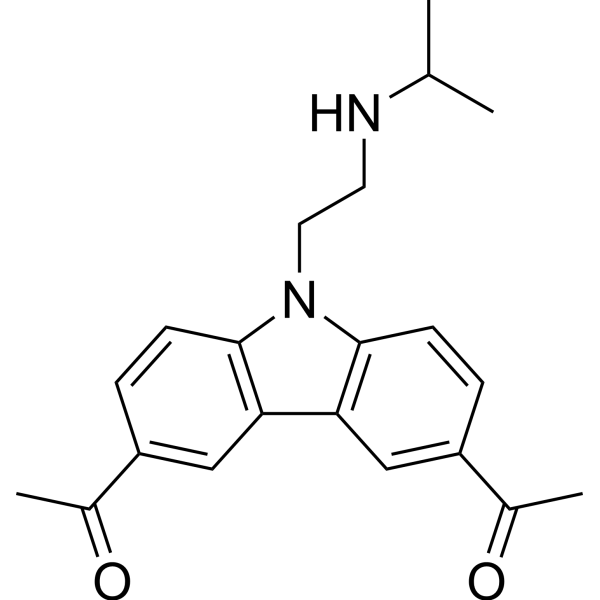
- HY-143412
-
|
|
HDAC
DNA/RNA Synthesis
Apoptosis
|
Cancer
|
|
MIR002 is a potent and orally active DNA polymerase α (POLA1) and HDAC 11 dual inhibitor. MIR002 induces acetylation of p53, activation of p21, G1/S cell cycle arrest, and apoptosis. MIR002 shows significant antitumor activity in vivo .
|
-
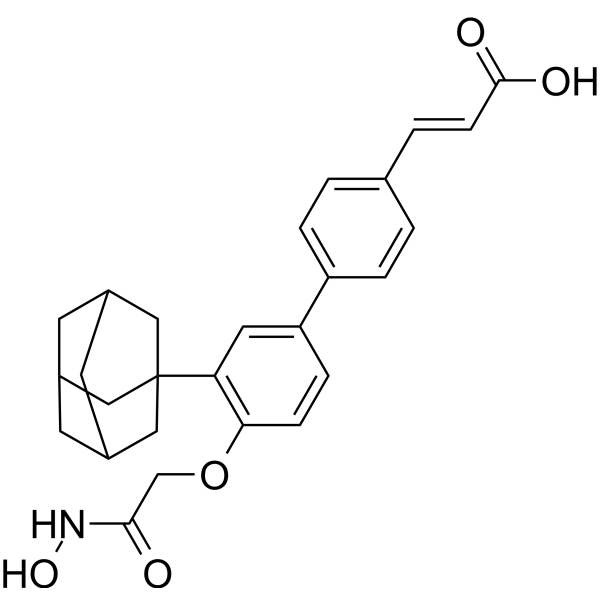
- HY-114372
-
|
|
Lipoxygenase
Caspase
Apoptosis
|
Cancer
|
|
Lycopodine, a pharmacologically important bioactive component derived from Lycopodium clavatumspores, triggers apoptosis by modulating 5-lipoxygenase, and depolarizing mitochondrial membrane potential in refractory prostate cancer cells without modulating p53 activity . Lycopodine inhibits proliferation of HeLa cells through induction of apoptosis via caspase-3 activation .
|
-
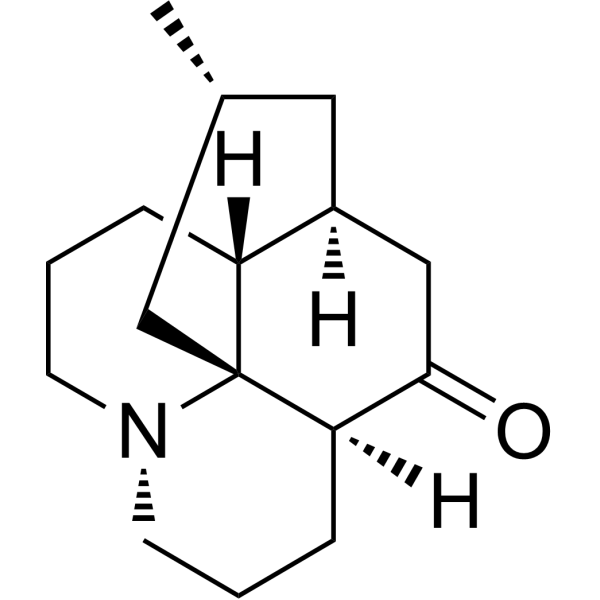
- HY-134823
-
|
|
MDM-2/p53
PROTACs
E1/E2/E3 Enzyme
|
Cancer
|
|
MD-222 is the first-in-class highly potent PROTAC degrader of MDM2. MD-222 consists of ligands for Cereblon and MDM2. MD-222 induces rapid degradation of the MDM2 protein and activation of wild-type p53 in cells. MD-222 has anticancer effects .
|
-
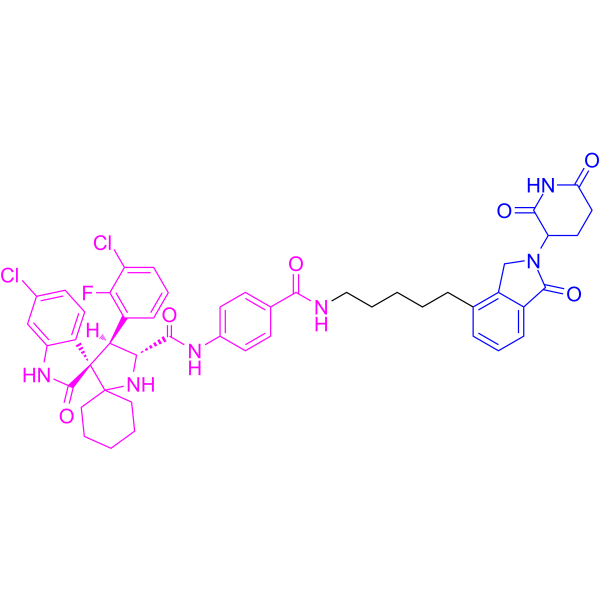
- HY-156135
-
|
|
RET
|
Others
|
|
NSC194598 is a p53 DNA-binding inhibitor with IC50 value of 180 nM and 2-40 μM for in vitro and in vivo, respectively. NSC194598 interferes with transcriptional activation of mutated RET gene in human medullary thyroid carcinoma TT cells. NSC194598 can be used for acute toxicity to normal tissues by radiation and chemotherapy research .
|
-
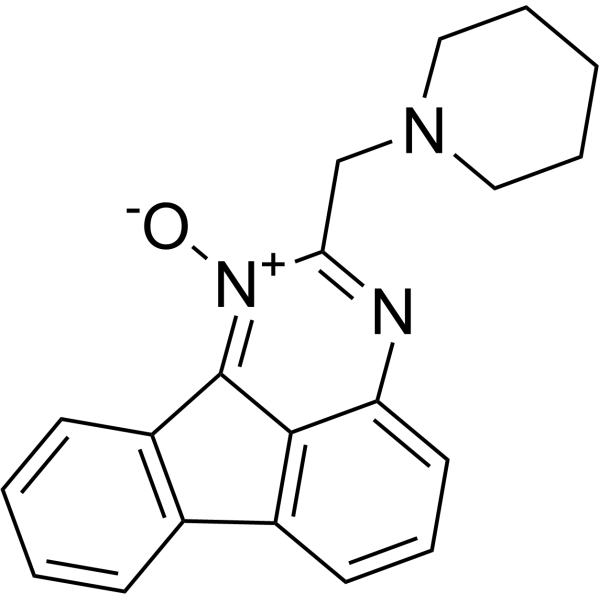
- HY-100035
-
|
|
|
|
|
PT-262 is a potent ROCK inhibitor with an IC50 value of around 5 μM. PT-262 induces the loss of mitochondrial membrane potential and elevates the caspase-3 activation and apoptosis. PT-262 inhibits the ERK and CDC2 phosphorylation via a p53-independent pathway. PT-262 blocks cytoskeleton function and cell migration. PT-262 has anti-cancer activity .
|
-
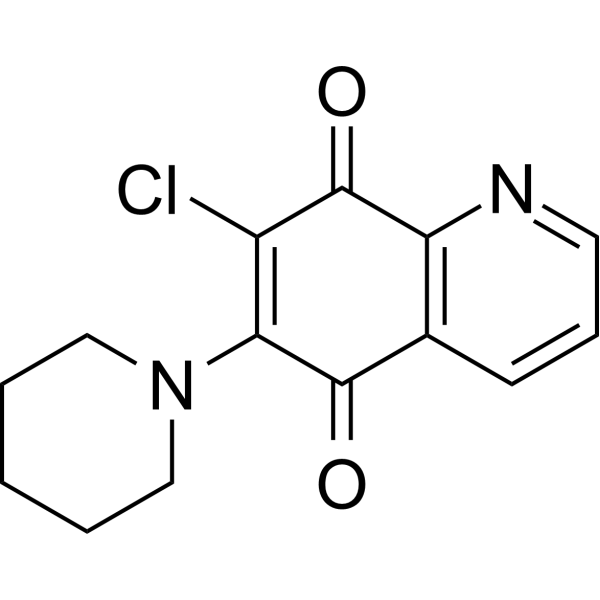
- HY-117857
-
-
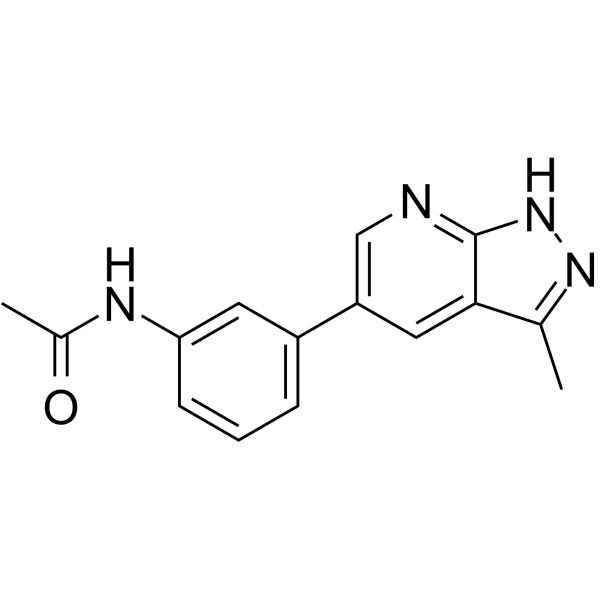
- HY-143411
-
|
|
HDAC
Apoptosis
DNA/RNA Synthesis
|
Cancer
|
|
GEM144 is a potent and orally active DNA polymerase α (POLA1) and HDAC 11 dual inhibitor. GEM144 induces acetylation of p53, activation of p21, G1/S cell cycle arrest, and apoptosis. GEM144 has significant antitumor activity in human orthotopic malignant pleural mesothelioma xenografts .
|
-
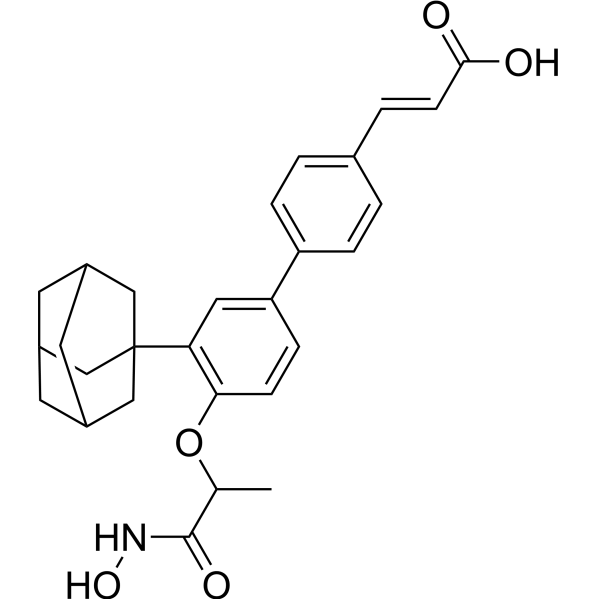
- HY-146516
-
|
|
MDM-2/p53
Apoptosis
Reactive Oxygen Species
|
Cancer
|
|
Anticancer agent 42 (compound 10d) is an orally active anticancer agent, and shows a potent antitumor activity against MDA-MB-231 cell with an IC50 of 0.07 μM. Anticancer agent 42 can exert its anticancer activity by activating apoptotic pathway and p53 expression. Anticancer agent 42 can be used to study metastatic breast cancer .
|
-
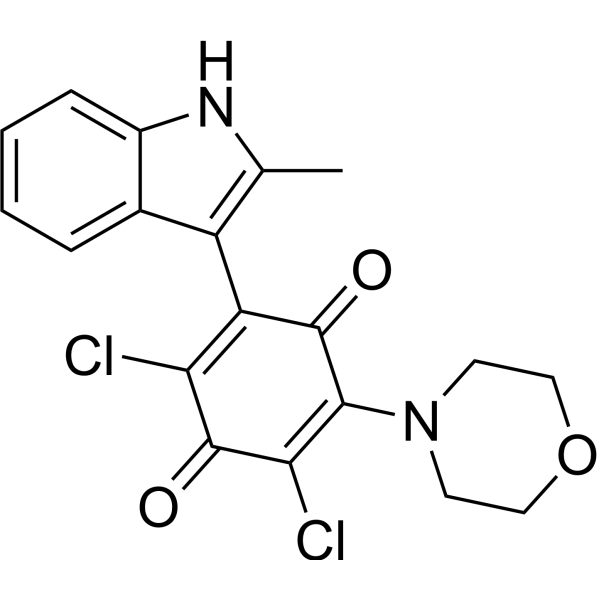
- HY-15510
-
|
|
MDM-2/p53
Dihydroorotate Dehydrogenase
Sirtuin
Autophagy
|
Cancer
|
|
Tenovin-6, an analog of Tenovin-1 (HY-13423), is an activator of p53 transcriptional activity. Tenovin-6 inhibits the protein deacetylase activities of purified human SIRT1, SIRT2, and SIRT3 with IC50s of 21 μM, 10 μM, and 67 μM, respectively. Tenovin-6 also inhibits dihydroorotate dehydrogenase (DHODH) .
|
-
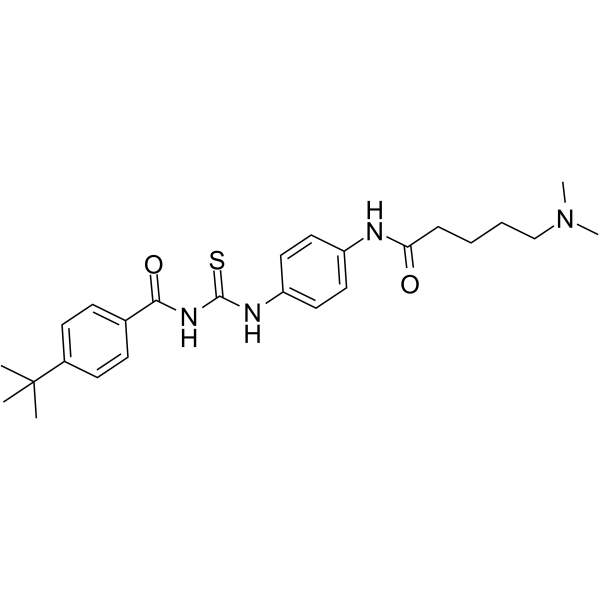
- HY-15510B
-
|
|
MDM-2/p53
Dihydroorotate Dehydrogenase
Sirtuin
Autophagy
|
Cancer
|
|
Tenovin-6 Hydrochloride, an analog of Tenovin-1 (HY-13423), is an activator of p53 transcriptional activity. Tenovin-6 Hydrochloride inhibits the protein deacetylase activities of purified human SIRT1, SIRT2, and SIRT3 with IC50s of 21 μM, 10 μM, and 67 μM, respectively. Tenovin-6 Hydrochloride also inhibits dihydroorotate dehydrogenase (DHODH) .
|
-
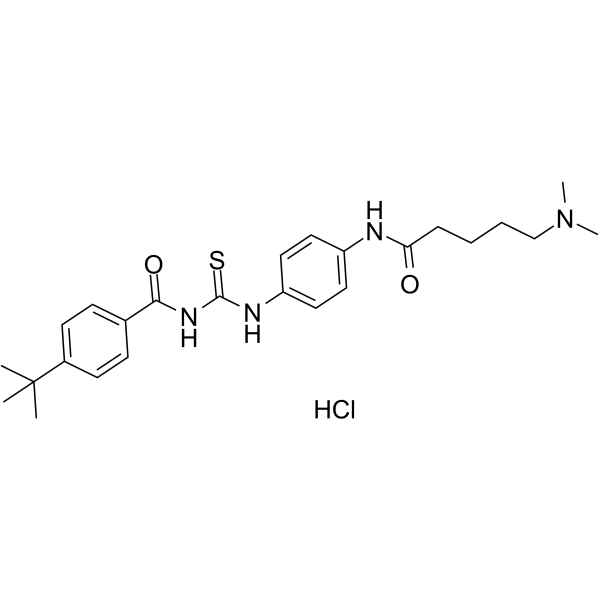
- HY-107426
-
|
Muconomycin A
|
Apoptosis
Reactive Oxygen Species
|
Cancer
|
|
Verrucarin A (Muconomycin A), a Type D macrocyclic mycotoxin derived from the pathogen fungus Myrothecium verrucaria, is an inhibitor of protein synthesis. Verrucarin A inhibits growth of leukemia cell lines and activates caspases and apoptosis and inflammatory signaling in macrophages. Verrucarin A effectively increased the phosphorylation of p38 MAPK and diminished the phosphorylation of ERK/Akt. Verrucarin A caused cell cycle deregulation through the induction of p21 and p53 .
|
-
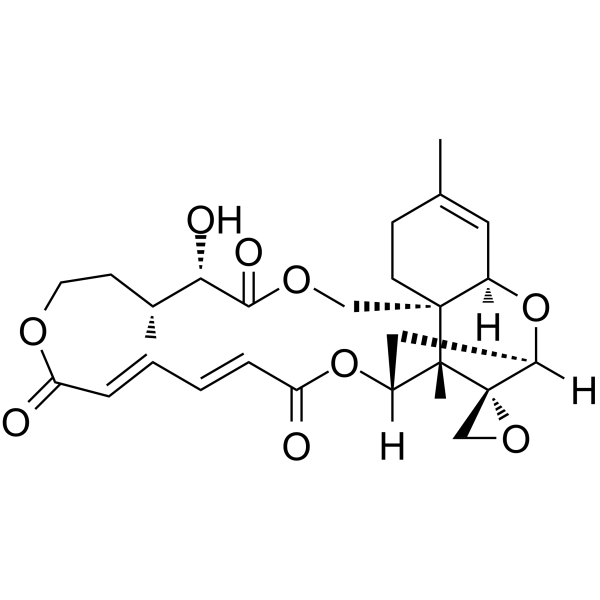
- HY-B0294
-
|
|
Parasite
Microtubule/Tubulin
STAT
MDM-2/p53
Apoptosis
Autophagy
|
Infection
Cancer
|
|
Flubendazole is an anthelmintic drug based on altering microtubule structure, inhibition of tubulin polymerization and disruption of microtubule function. Flubendazole induces apoptosis in human colorectal cancer (CRC) by blocking the STAT3 signaling axis and activation of autophagy. Flubendazole induces P53 expression and reduced Cyclin B1 and p-cdc2 expression. Flubendazole is an antitumor agent. Flubendazole can be used for worm and intestinal parasites .
|
-
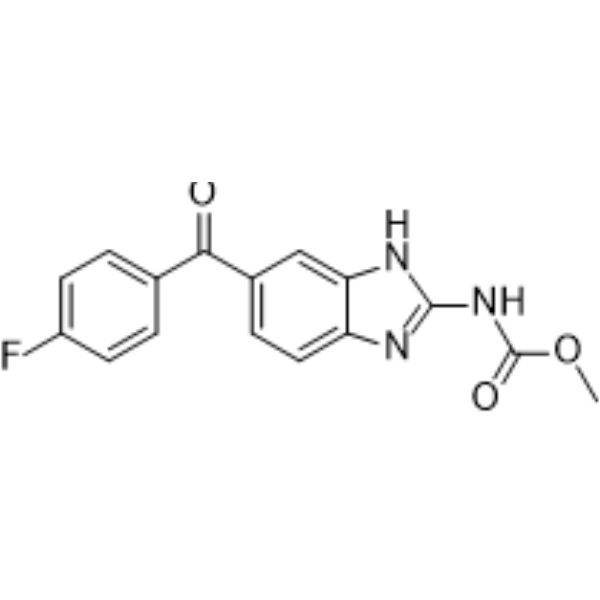
- HY-13721
-
|
Idronoxil; Dehydroequol; Haginin E
|
Caspase
Apoptosis
Topoisomerase
|
Cancer
|
|
Phenoxodiol (Idronoxil), a synthetic analog of Genestein, activates the mitochondrial caspase system, inhibits XIAP (an apoptosis inhibitor), and sensitizes the cancer cells to Fas-mediated apoptosis. Phenoxodiol also inhibits DNA topoisomerase II by stabilizing the cleavable complex. Phenoxodiol induces cell cycle arrest in the G1/S phase of the cell cycle and upregulates p21 WAF1 via a p53 independent manner .
|
-
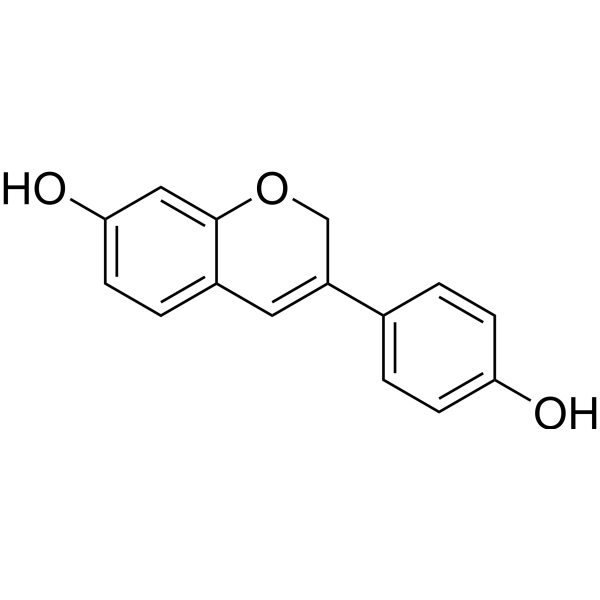
- HY-B0413
-
|
|
Parasite
HIF/HIF Prolyl-Hydroxylase
Microtubule/Tubulin
Antibiotic
|
Infection
|
|
Fenbendazole is an orally active benzimidazole anthelmintic agent, with a broad antiparasitic range. Fenbendazole is a microtubule destabilizing agent and acts on helminthes primarily by binding to tubulin and disrupting the tubulin microtubule equilibrium. Fenbendazole stabilizes the transcriptional activator HIF-1α. Fenbendazole possesses an efficient anti-proliferative activity and induces apoptosis. Fenbendazole causes cell-cycle arrest and mitotic cell death, and has antitumor activity in mice xenografted with wild-type p53 .
|
-
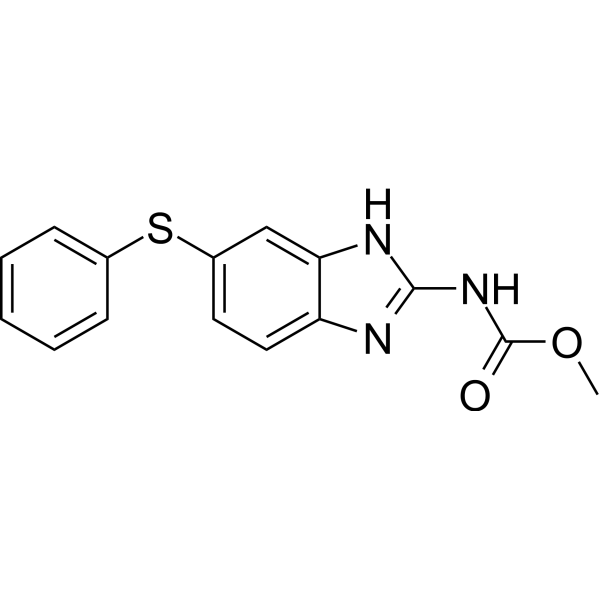
- HY-100671
-
|
|
Histone Acetyltransferase
STAT
|
Inflammation/Immunology
Cancer
|
|
L002 is a potent, cell permeable, reversible and specific acetyltransferase p300 (KAT3B) inhibitor with an IC50 of 1.98 μM . L002 binds the acetyl-CoA pocket and competitively inhibits the FATp300 catalytic domain, blocks histone acetylation and p53 acetylation, and inhibits STAT3 activation . L002 has the potential for hypertension‐induced cardiac hypertrophy and fibrogenesis treatment .
|
-
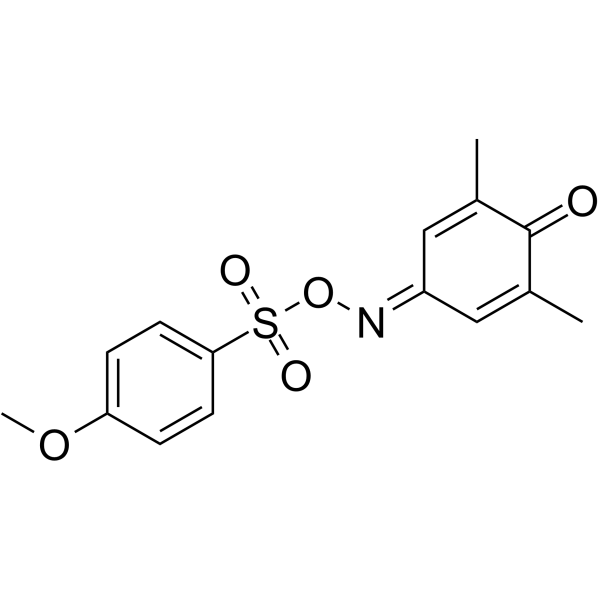
- HY-B0413S
-
|
|
HIF/HIF Prolyl-Hydroxylase
Parasite
Microtubule/Tubulin
Antibiotic
|
Infection
|
|
Fenbendazole-d3 is a deuterium labeled Fenbendazole. Fenbendazole-d3 is a HIF-1α agonist and activates the HIF-1α-related GLUT1 pathway. Fenbendazole is an orally active benzimidazole anthelmintic agent, with a broad antiparasitic range. Fenbendazole is a microtubule destabilizing agent. Fenbendazole causes cell-cycle arrest and mitotic cell death, and has antitumor activity in mice xenografted with wild-type p53[1][2][3][4].
|
-
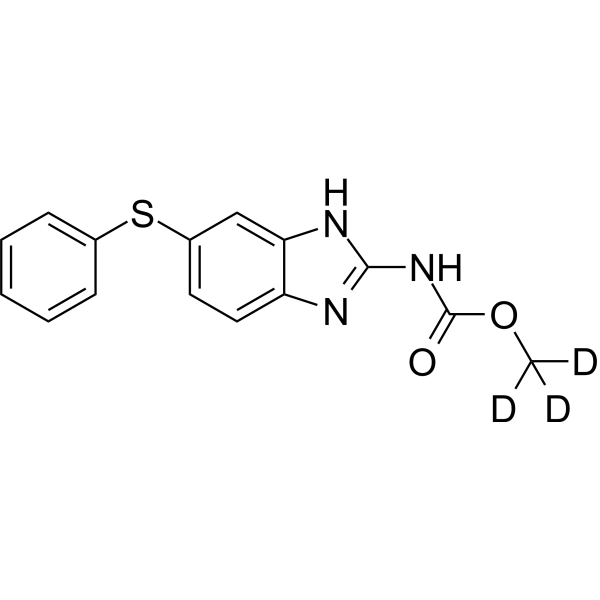
- HY-10412
-
|
KT7515
|
JNK
Mixed Lineage Kinase
MDM-2/p53
|
Neurological Disease
|
|
CEP-1347 is an inhibitor of the JNK/SAPK pathway with neuroprotective effects. CEP-1347 blocks JNK1 activation induced by members of the mixed lineage kinase (MLK) family (MLK3, MLK2, MLK1, dual leucine zipper kinase, and leucine zipper kinase). As an inhibitor of MDM4, CEP-1347 can more effectively inhibit the growth of glioma cells expressing wild-type p53 .
|
-
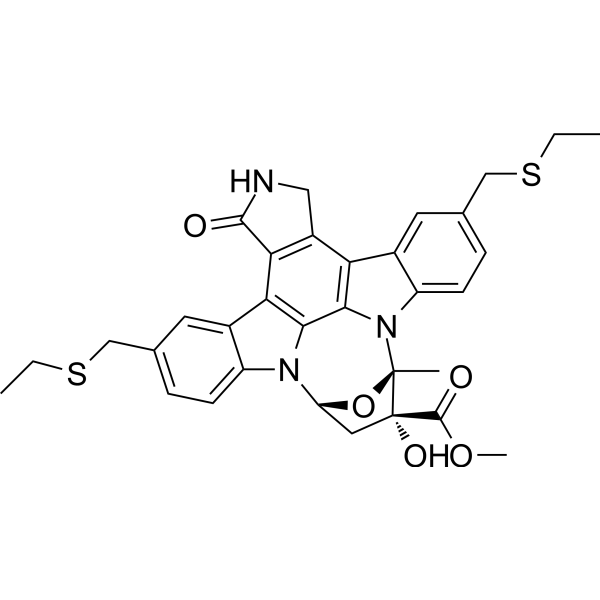
- HY-122815
-
|
Fusicoccin A
|
Apoptosis
|
Cancer
|
|
Fusicoccin (Fusicoccin A), a fungal pytotoxin, is a stabilizer of specific 14-3-3 protein-protein interactions. Fusicoccin sabilizes H +-ATPase/14-3-3 cmplex in pants, maintaining the enzyme in activated state. Fusicoccin also stabilizes 14-3-3 protein interactions with binding partners containing a C-terminal 14-3-3 recognition motif (a mode 3 motif), such as ERα, GPIbα, TASK3, CTFR, and p53. Fusicoccin induces apoptosis in cancer cells and has anticancer activity .
|
-
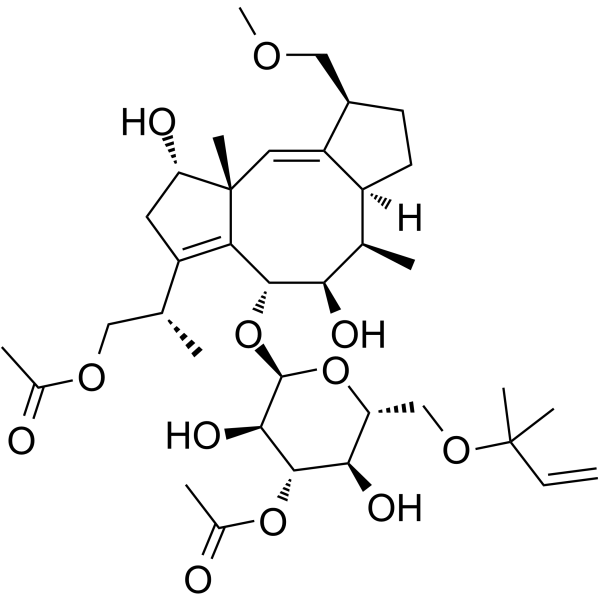
| Cat. No. |
Product Name |
Type |
-
- HY-108433
-
|
Carnitine palmitoyltransferase 2
|
Biochemical Assay Reagents
|
|
CPT2 (Carnitine palmitoyltransferase 2), an enzyme that participates in fatty acid oxidation, also is a colorectal cancer (CRC) prognostic biomarker. CPT2 overexpression can activate p-p53 to increase p53 expression, thereby inhibiting tumor proliferation and promoting apoptosis. CPT2 deficiency results in the most common inherited disorder of long-chain fatty acid oxidation affecting skeletal muscle. Downregulation of CPT2 is also highly correlated with the progression of various cancers and has potential for cancer research .
|
| Cat. No. |
Product Name |
Target |
Research Area |
-
- HY-P1562
-
|
|
Bcl-2 Family
|
Cancer
|
|
PUMA BH3 is a p53 upregulated modulator of apoptosis (PUMA) BH3 domain peptide, acts as a direct activator of Bak, with a Kd of 26 nM.
|
-
- HY-P1562A
-
|
|
Bcl-2 Family
|
Cancer
|
|
PUMA BH3 TFA is a p53 upregulated modulator of apoptosis (PUMA) BH3 domain peptide, acts as a direct activator of Bak, with a Kd of 26 nM .
|
| Cat. No. |
Product Name |
Category |
Target |
Chemical Structure |
| Cat. No. |
Product Name |
Chemical Structure |
-
- HY-B0413S
-
2 Publications Verification
|
|
Fenbendazole-d3 is a deuterium labeled Fenbendazole. Fenbendazole-d3 is a HIF-1α agonist and activates the HIF-1α-related GLUT1 pathway. Fenbendazole is an orally active benzimidazole anthelmintic agent, with a broad antiparasitic range. Fenbendazole is a microtubule destabilizing agent. Fenbendazole causes cell-cycle arrest and mitotic cell death, and has antitumor activity in mice xenografted with wild-type p53[1][2][3][4].
|
-

-
- HY-16271S
-
|
|
|
Kevetrin (hydrochloride)- 13C2, 15N3 is the 13C-labeled and 15N-labeled Kevetrin (hydrochloride). Kevetrin hydrochloride is a small molecule and activator of the tumor suppressor protein p53, with potential antineoplastic activity.
|
-

Your information is safe with us. * Required Fields.
Inquiry Information
- Product Name:
- Cat. No.:
- Quantity:
- MCE Japan Authorized Agent:




















































































